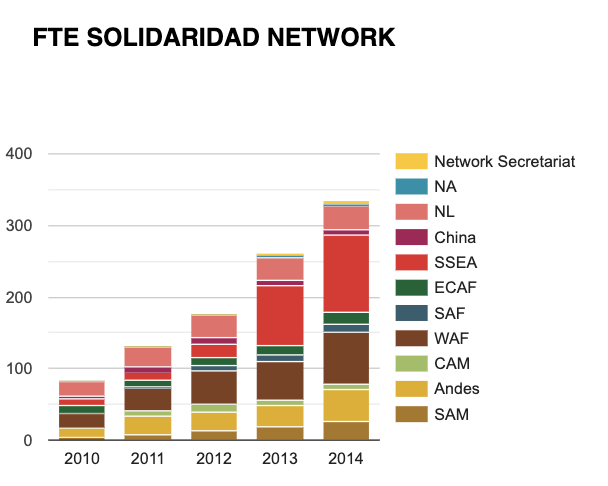- SOUTH AMERICA
- THE ANDES
- CENTRAL AMERICA
- WEST AFRICA
- SOUTHERN AFRICA
- EAST & CENTRAL AFRICA
- SOUTH & SOUTH-EAST ASIA
- CHINA
- THE NETHERLANDS
- NORTH AMERICA
By engaging with leading companies in the region, Solidaridad increased the supply of soy produced in 2014 under several systems of sustainable management, confirming that a change of mindset in producers can drive bottom-up market transformation.

In 2014 Minera Yanaquihua, a small gold mine, received Responsible Jewellry Council (RJC) certification. This represents an important milestone because it proves that it’s possible for smaller mines to adopt responsible business practices in gold extraction and processing.

Pilot projects for palm oil in Honduras and Guatemala and for sugarcane in Mexico have expanded, as sustainability standards were shown to be both attainable and effective for all stakeholders. By the end of the year, producers and processors throughout the region were asking to participate.

Solidaridad has taken its producer support programmes beyond voluntary certification standards by encouraging discussions on new policy and working with partners to support producers in the various value chains.

Expansion of the middle and upper classes in Africa continues, presenting a huge opportunity for local farmers and entrepreneurs. Solidaridad is exploring how to link the economic growth of the cities to opportunities in rural Africa.

Solidaridad has expanded, creating further opportunities for growth. Strengthening staff capacity was a key priority in 2014, as was maintaining good relationships with donors. In addition, new partnerships have given us an opportunity to develop exciting new projects.

With growing populations and the impact of climate change, the availability of land and water is under strain. We help organize the market in such a way that will ensure food security, reduce poverty and encourage all stakeholders to manage ecosystems sustainably.

Given that China has the highest demand for imports of global commodities such as palm oil and soy, Solidaridad is engaging with key stakeholders to explore China’s potential role as a model for promoting sustainability worldwide.

Solidaridad continues to work towards long-term, sector-wide impacts across a range of commodities in far-reaching partnerships with, among other companies, H&M and Unilever. While the Dutch Ministry of Foreign Affairs and the Dutch Postcode Lottery remain primary donors, Solidaridad has broadened its donor base.

Solidaridad has now fully grown into its role as an adviser to North American consumer goods companies and private foundations on issues such as sectoral trends, multi-stakeholder initiatives, opportunities and risks within supply chains, and we continue to engage in partnerships that are set up to achieve sustainability targets.

Foreword by Nico Roozen
The past year was an exciting one for Solidaridad. Our activities grew strongly and we were thus able to significantly increase the impact of our programmes worldwide.
The consolidated figures from the Solidaridad Network show an increase in our overall budget from €33,800,000 in 2013 to €42,387,000 in 2014. This figure is slightly above target. In terms of staff, the Network increased from 277 employees worldwide at end of 2013 to 365 employees by the end of 2014. These are remarkable figures in a particularly challenging Official Development Assistance environment, which has resulted in much lower budgets for many of our colleague organizations.

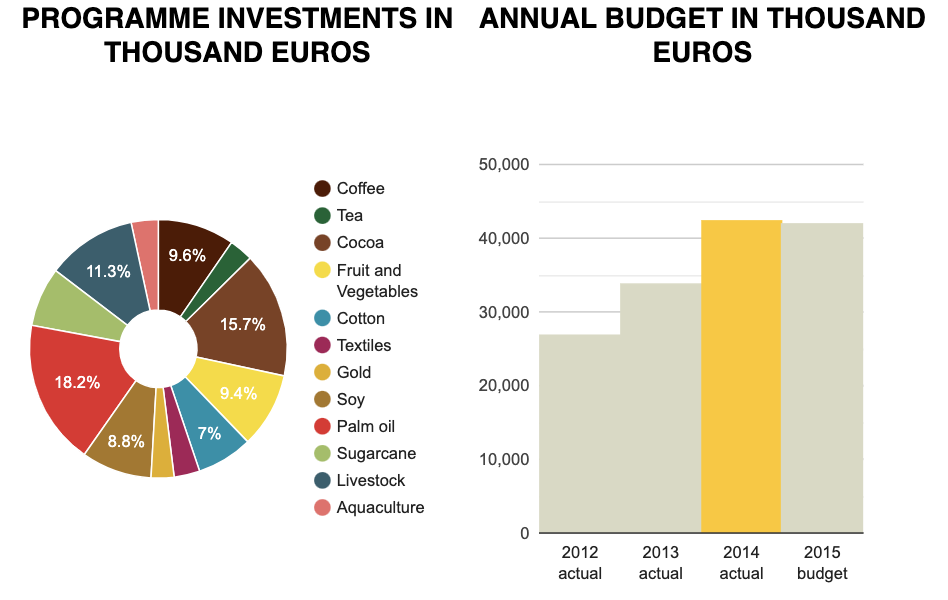
Growth represents both an opportunity and a challenge. It’s an opportunity to achieve even greater impact together with our partners and thus make a real difference for more people. However, growth also challenges us to improve our internal structures and processes, integrate new staff and strengthen cooperation within our network organization.
Internal and external evaluations both indicate that our programmes are having a positive impact on the agricultural and mining sectors, as well as the fashion industry. In 2014, we were able to intensify our cooperation with companies along their supply chains and we increased the confidence funding agencies have in our operations.
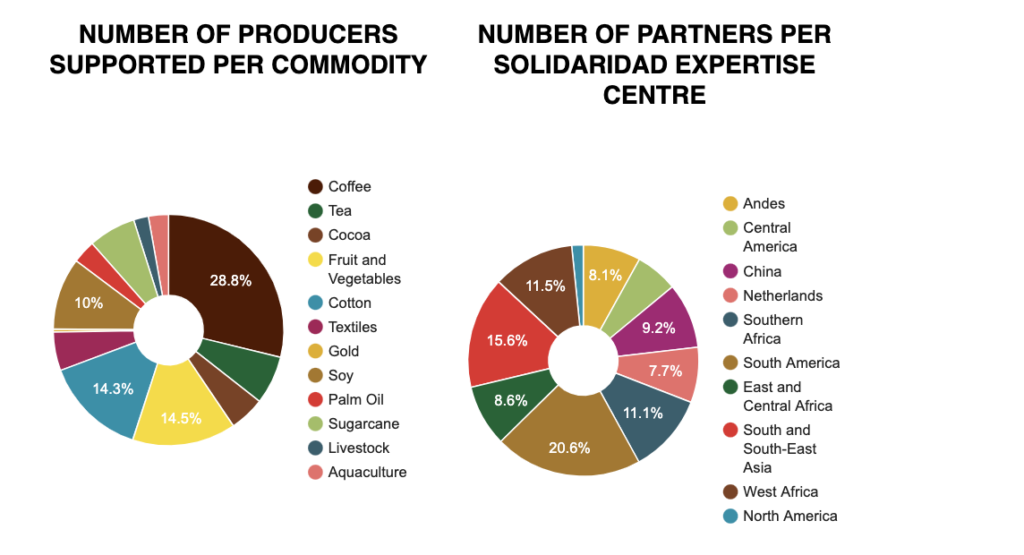
We held many discussions about Ambition 2020 – our new five-year strategic plan. If we wish to further improve the good practices of farmers, miners and industrial workers, we clearly need to define an ambitious, innovative agenda. This must include building more robust production-related infrastructures supported by an enabling policy environment that will make it possible to achieve lasting improvements. What’s more, to increase the scale of our programmes and bring them into the mainstream, we need to ensure that sustainable, fair-trade programmes become part of government and corporate policies and are adopted in an increasing range of sectors and markets.
Internally, we have invested in our quality systems. The transition towards a more flexible programme management system (Solidaridad Plaza) was a major step last year. Plaza – a cloud-based system developed with Salesforce technology – allows us to develop applications and gives us an advanced global communication infrastructure. This platform is proving to be indispensable to the exchange of information and efficient communication.
We’ve also integrated our regional websites and launched a new corporate website that’s connected with Plaza so that information is easier to find. In addition, we have published this annual report as a website. These developments are contributing considerably to our visibility and making our communication as a global organization more professional.
Just five years ago we started out on a journey towards becoming a network organization with the expectation that it would take 10 years to build a new mature structure and that this process would require an investment of around €10 million (based on the 10/10 formula). Now halfway there, we’ve made an investment of €6.4 million in this transition. We have already achieved more than we thought possible and the will and spirit is there to finish the job in the years ahead.
Nico Roozen,
Executive Director
VISION AND MISSION
CREATING CHANGE THAT MATTERS
In 2012, Solidaridad formulated a new vision and mission. This was an intensive process, which involved people from around the world.
Solidaridad is an international network organization with partners all over the world. There is a single agenda and a single strategy: together we learn and progress, together we achieve results, and together we decide on future steps.
Solidaridad is an organization for international cooperation that draws inspiration from the vision, values and capacities of people all over the world.
Solidaridad is a transition manager, focusing on producer support and sustainable supply chain and market development. We partner with those who want to make a difference by changing business practices from being a part of the problem to being a part of the solution. Markets have to work for the poor, and companies are the key change makers.
From a shared vision to change that matters.
Our aim is to make an impact by being the best in building partnerships, in piloting and scaling up programmes, in learning and innovation.
Without a dream there is no first step. At the beginning there are no paved roads; simply by starting to walk, a path is created. Knowledge and values are needed. Skilled and motivated people are our capital. We are realists with a mission. We turn shared vision into meaningful impact in communities.
Solidaridad envisions a world where the people who produce the resources on which we all depend can contribute to change that matters, change that leads to prosperity for all, without harming each other or the environment. This therefore helps to ensure that resources will continue to sustain us for generations to come.
Today, the global economy is not organized in a sustainable way. Many of us now realize that an unsustainable way of life threatens food security, our planet and our businesses. With a world population projected to grow to 9 billion people by 2050, we can only be fed if the agricultural sector makes a transition to smart and sustainable land use. And, as fossil fuel use becomes increasingly problematic, a transition to a bio-based economy is needed. Farmers worldwide therefore have a bright future as providers of food and suppliers of renewable energy and raw materials. They link as never before the issues of food security for developing countries and prosperity for the world as a whole.
Many of us now realize that an unsustainable way of life threatens our food security, our planet and our businesses.
There is one agenda, one challenge: We have to produce more with less, and ensure that it is done in a way that sustains people and the environment. Optimizing land use is the first step towards a solution. Increased production must meet growing demand, but with fewer negative consequences for people and the environment. More efficient production must be coupled with less pollution. There must be greater precision in the use of fertilizers and pesticides, and a reduction in the use of water and energy. Waste then becomes a thing of the past. Losses in the supply chain are reduced. Forests are no longer cut down and additional land is no longer needed because existing agricultural land is being used more efficiently.
There is a single agenda and a single challenge: we must produce more with less and ensure that it’s done in a way that sustains people and the environment.
An inclusive economy – one in which people can participate fully – is needed. It should start with the recognition of the potential of smallholder farmers and women, who are often the leading drivers of sustainable change. It must respect workers’ rights, provide a safe and healthy workplace, and support a living income for farmers and workers.
For children, school is the best place to work. Mining and industry need to switch to a responsible means of production. Workers’ rights are respected and the environment is preserved for future generations, keeping its potential intact.
The change we seek is a market process driven by the private sector. However, civil society organizations and governments play an essential role in enabling and encouraging change. In this process, Solidaridad is a transition manager. We back farmers who are economically poor but have rich potential, entrepreneurial men and women, and workers who want to build their livelihoods on a fair income. Solidaridad partners with all parties in the supply chain, so that everyone can be involved in creating change that matters.
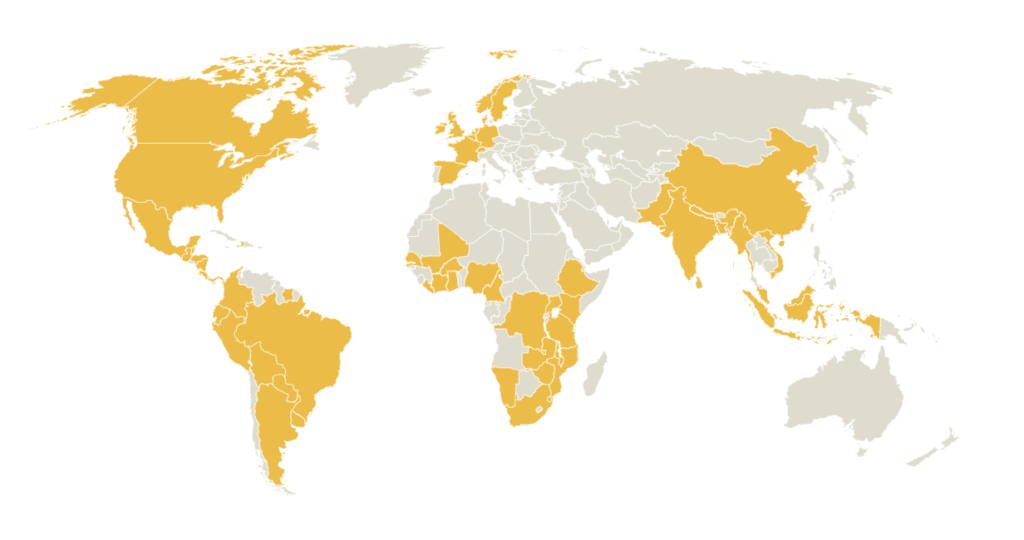
COMMODITY PROGRAMS
Solidaridad works to create sustainable supply chains from the producers to consumers. We manage global programmes for 12 of the world’s most important commodities. Visit the sections below to learn more about our impact in 2014.
TOWARDS FUTURE-PROOF COFFEE PRODUCTION
The coffee programme is all about sustainability, livelihoods and good governance. In 2014, we engaged with governments to enhance legal compliance and avoid deforestation. We strengthened food security for smallholder farmers and our climate adaptation strategies in Latin America have made farmers more resilient to climate change.
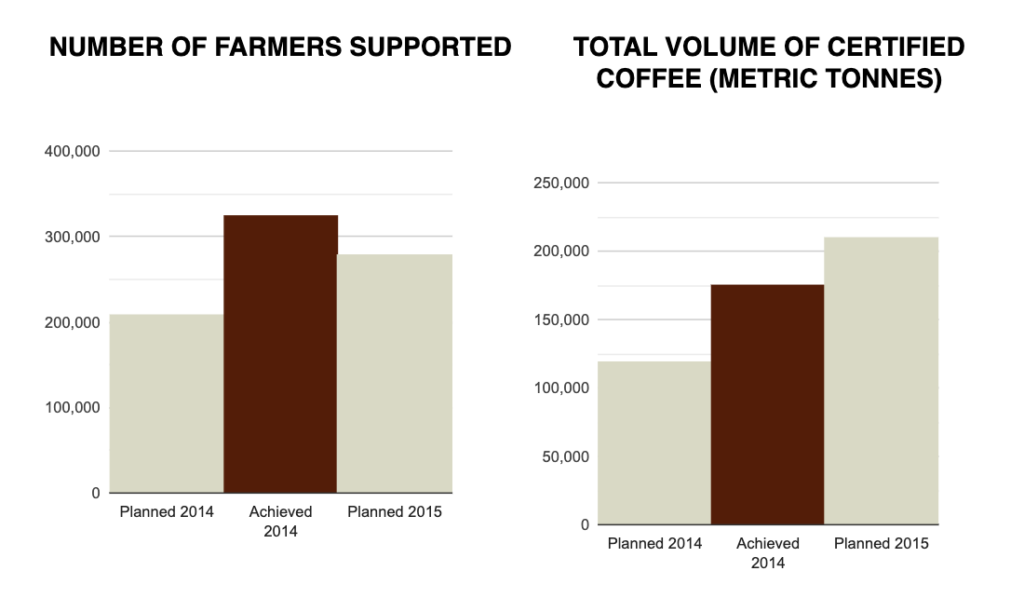
TOWARDS FUTURE-PROOF COFFEE PRODUCTION
The coffee programme is all about sustainability, livelihoods and good governance. In 2014, we engaged with governments to enhance legal compliance and avoid deforestation. We strengthened food security for smallholder farmers and our climate adaptation strategies in Latin America have made farmers more resilient to climate change.
REGIONAL COMMODITY PROGRAMMES
Solidaridad´s strategic approach to supporting producers is in the process of scaling up its methodology and tools to enable the training of trainers and producers in Colombia. The sustainable trade platform (STP) project, which includes the most important players in the coffee sector, is the basis for moving from the testing phase to the scaling-up phase.

Solidaridad’s project BACK to REDD (Bringing Agriculture, Carbon and Knowledge to Reducing Emissions from Deforestation and Forest Degradation) in Mexico is helping farmers recover from the coffee leaf rust outbreak, renovate their plantations, use climate-smart practices to build resilient production systems, diversify agroforestry systems, and improve food security.

Solidaridad Netherlands collaborated with civil society organizations to launch the Coffee Barometer, which illustrates how coffee-growing areas are some of the most vulnerable regions on the planet to climate change. The initiative serves as a wake-up call to make the supply chain more sustainable.

Sustainable coffee production was the key target for the REC achieved by building the capacity of the key stakeholders. The food security project (FOSEK) has the potential to build resilience through sustained coffee and food crop production, helping to improve household livelihoods.

IMPACT
The use of the Cool Farm Tool, a carbon calculator, has given us detailed insight into the “carbon emission hotspots” related to coffee production in Latin America. Using these insights, we improved wastewater management related to depulping coffee in Mexico. In Colombia we helped make fertilizer use more efficient and reduced the risk of landslides by implementing shade-grown coffee production. In Peru we contributed to reducing deforestation rates by implementing production models in which market mechanisms provide incentives for avoiding deforestation. Through our public partnerships in Kenya and Ethiopia, we were able to improve cash incomes from other food crops. We also contributed to reducing the length of the annual period in which incomes are unstable and informed communities about more nutritious types of food. Integrating other food crops and livestock into coffee projects has improved the business case of coffee smallholders in East Africa.
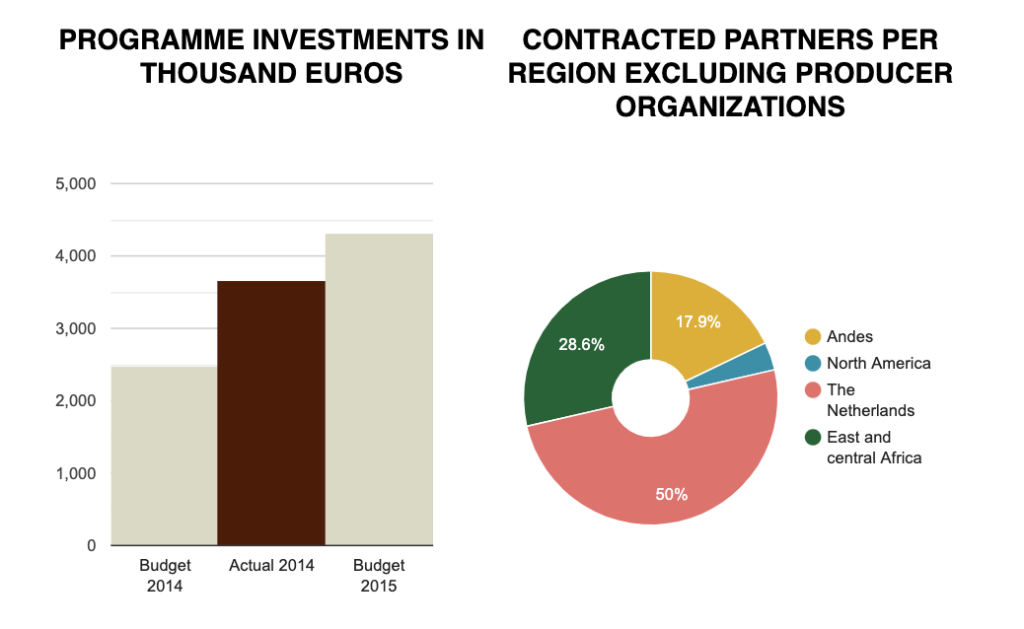
MARKET PARTNERSHIPS
Nestlé has become increasingly involved in our food security programme in East Africa in recent years. We lead the Coffee Sustainable Trade Platform (STP) in Colombia and we’ve succeeded in attracting $4.5 million from private and public sources to support the sustainability plans agreed by STP coffee members (eight companies and 32 coffee grower organizations).
In 2014 Solidaridad became a member of the Cool Farm Alliance, a multi-stakeholder initiative of companies established to reduce the environmental footprint of their supply chain. The Cool Farm Tool – an agricultural carbon calculator – now takes other environmental indicators such as biodiversity into account. We support improvements to the tool and promote it in the same way as, for example, Gold Standard and the Landscape Sustainable Production Standard.
SOLIDARIDAD’S COFFEE NETWORK

CHALLENGES AHEAD
Growing demand for coffee, combined with the forecasted scarcity, will transform buyers’ markets into sellers’ markets. But the lack of incentives for smallholders to produce more responsibly, in combination with the imbalance between certified production and sales, poses a threat to the market of sustainable coffee. World market prices will need to reflect the real price of sustainable coffee production. On the producer side, suboptimal use of inputs like fertilizers or irrigation, limited access to finance, declining plot sizes and technological innovations by smallholders are major barriers to increasing productivity and incomes. By improving the business case for smallholder coffee farming, we can help create value for all those involved in the supply chain. The growing use of technological innovations in the agriculture sector is particularly promising. In the future, governments and regulators will need to play a key role in addressing issues that go beyond the plots of individual coffee farmers, cooperatives or estates.
BRINGING TRANSFORMATIONAL CHANGE TO THE TEA SECTOR
The tea programme provides us with unique opportunities to develop sustainable supply chains. These are mainly located in African and Asian countries where millions of smallholders depend on Western markets. We are also developing new models for sustainability in the rapidly growing tea markets of Asia, with a special focus on India, China and Indonesia.
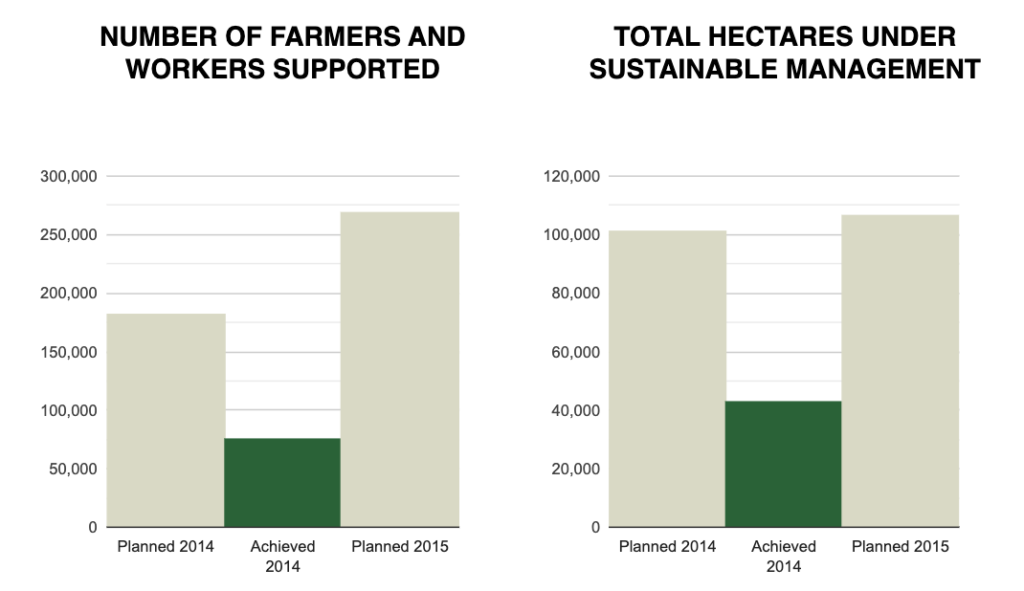
RESULTS
Tea producers are either workers on plantations or smallholders. We aim to raise wages, especially for women or casual workers, who lack the facilities of regular plantation workers and often face harassment as well as occupational health and safety issues. Smallholders are the main producers in China, Sri Lanka, Indonesia and Kenya, but they are often not part of the high-value supply chains of the large brands (except in Kenya). In 2014, we helped them raise productivity and prices, use pesticides and fertilizers more effectively, and engage in collectivisation.
We also helped businesses improve quality and productivity. As the manufacturing process determines to a large extent the final quality of tea as well as the prices paid to farmers, we worked to reduce adulteration of tea and inefficient energy use, and increase returns for farmers.
In the charts shown above, numbers achieved are lower than the original targets because the formal launch of the extensive Trustea Programme in India was delayed this year. The programme is expected to correct this discrepancy in 2015.
REGIONAL COMMODITY PROGRAMMES
The positive impact of the tea programme in Argentina has paved the way to start up a producer support and local market development intervention to scale-up results and replicate the business model region wide.

Our partnerships in the tea industry focused on addressing climate change, as well as issues related to youth and social inclusion. The annual tea drinking competition attracted plenty of interest and new entrants.

Solidaridad has played a pivotal role in implementing the Trustea programme, which aims to establish sustainable production in the Indian tea market, and the Teh Lestari scheme in Indonesia. Our partners in India are the Sustainable Trade Initiative (IDH), Hindustan Unilever Ltd and Tata Global Beverages.

Solidaridad Netherlands’ tea programme has trained its sights on Europe, where sustainable procurement and tea production concerns are falling behind targets. We aim to use our networking capacity in civil society to reestablish the sector’s commitment to 100% sustainable production.

IMPACT
Our tea programmes help build capacity and assist in verification and certification. These efforts increase the overall sustainability of the tea sector, improving the livelihoods of small-scale growers, and securing the supply of ethically produced tea for tea businesses around the world.
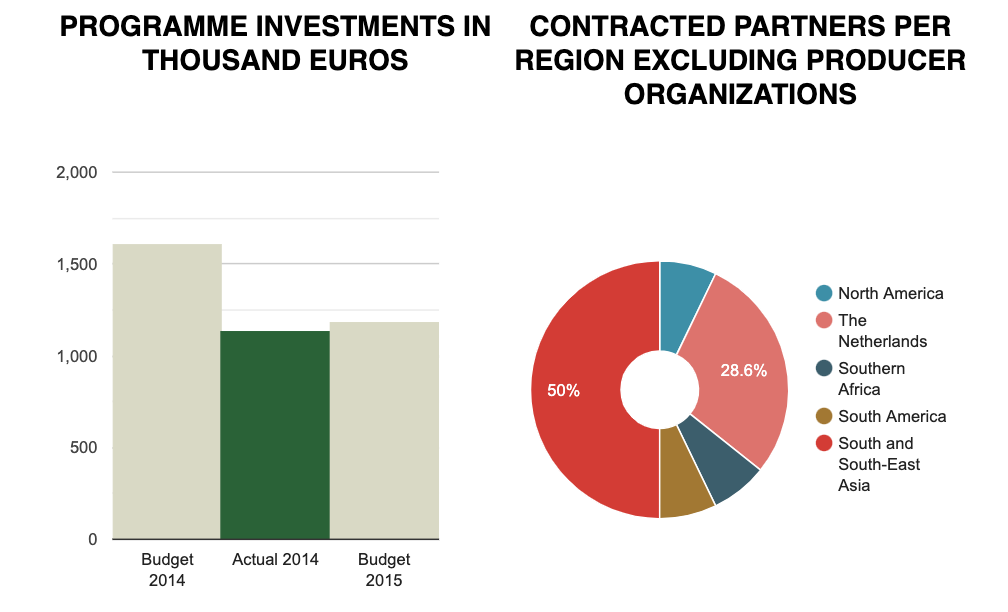
MARKET PARTNERSHIPS
The Sustainable Trade Initiative-IDH, Hindustan Unilever Limited and Tata Global Beverages fund the Trustea programme in India. In order to transform the tea industry, we focus on regional donors and their areas of interest. We also involve businesses in our sustainability agenda, helping them to achieve their CSR ambitions. We work with agencies such as Centre for Promotion of Imports from developing countries (CBI), GAIN, Value Added in Africa and Irish Aid. We also intend to write joint proposals with TRF and the East Africa Tea Trade Association (EATTA) for doing work with small farmers.
There is also scope for cooperating with businesses that source tea from Uganda, Tanzania, Rwanda and Burundi on climate change mitigation strategies, programmes related to HIV Aids and nutrition, and “socio-training” (skills training so that farmers can generate income from sources other than tea and form self-help groups to explore microfinance opportunities).
SOLIDARIDAD’S TEA NETWORK

CHALLENGES AHEAD
Fair returns for smallholders and workers, including marginalized casual workers, are a key target, alongside improving gender rights, reducing the use of banned agro-chemicals (which can damage the health of workers), developing climate-resilient tea farming and adopting new smart technologies. These include promoting “tissue culture” to develop drought-resilient varieties and using weather forecasting technologies and state-of-the-art ITC for communication (tea fields are located in remote areas where receiving timely information is critical). To achieve all of this, we may need to bring in professional capacity from qualified agencies to reinforce our own staff.
The global tea industry also faces a number of challenges. The impact of the first phase of certification still needs to be fully assessed and many Asian tea estates and smallholders have remained out of the scope of global sustainability certification programmes, despite the fact that 74% of global tea is consumed in Asia. As tea marketing companies are increasingly committed to sustainable tea, Asian tea markets, too, need to move in this direction.
ADDRESSING THE ROOT CAUSES OF UNSUSTAINABLE COCOA PRODUCTION
We have invested in training producers in good agricultural practices and sustainability standards. Yet, despite major improvements in productivity, many farmers still live in poverty. What’s more, young farmers are no longer interested in cocoa farming. So, in 2014 we launched a new intensification strategy, in particular addressing young farmers.
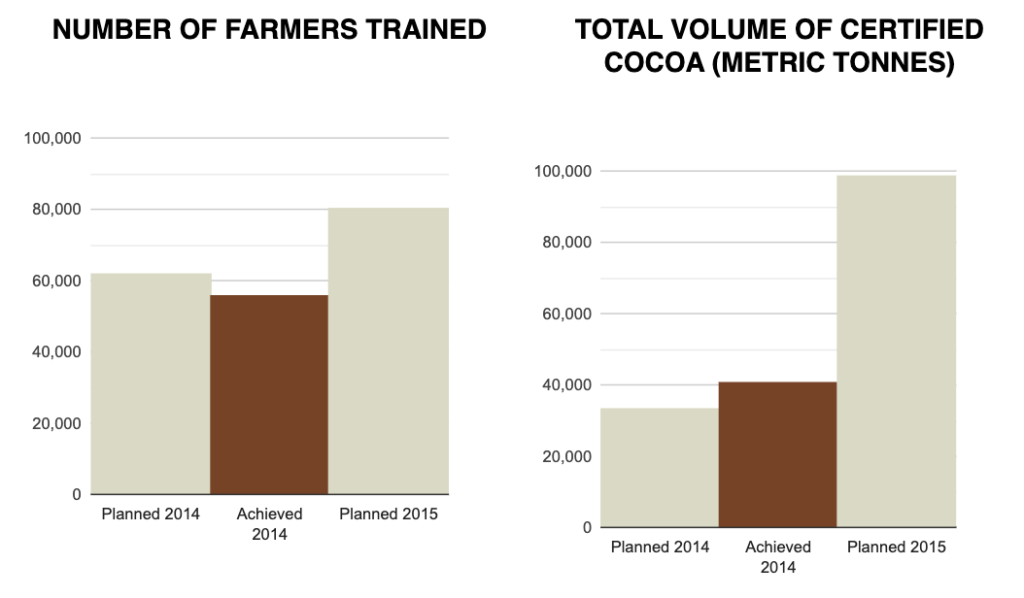
RESULTS
In the past year, 56,000 farmers with 80,000 ha under production were trained in good agricultural, social and environmental practices in Ghana, Ivory Coast and Nigeria. And over 10,000 farmers were trained in business-related issues such as optimizing fertilizer use and rehabilitation. A start has been made on setting up 15 rural service centres and 30 demonstration farms, focusing on cocoa rehabilitation. Around 20,000 farmers who expressed an interest in these rural service centres have been profiled.
A broader sustainability approach with an emphasis on economic sustainability has taken shape with the start of the CORIP programme in Ghana. The development of a robust agricultural infrastructure is at the core of this programme. We are also a co- developing a programme for the next generation of cocoa farmers together with the Master Card Foundation.
REGIONAL COMMODITY PROGRAMMES
Cocoa as a crop offers farmers the opportunity to increase and diversify their income, overcome poverty, improve food security, and develop resilient production systems. Unmet demand for fine quality cocoa originating in Mesoamerica is driving intense interest and investment to improve yields, quality and technical training.

Solidaridad’s partnership with Cargill and Mondelez gives us the opportunity to pioneer a landscape approach and develop the business case for sustainable cocoa production in the Amazon region, focused on smallholder producers, using the Rural Horizons methodology.

Solidaridad Netherlands was an active participant in the International Cocoa Organization (ICCO), culminating in a keynote presentation at the ICCO’s World Cocoa Conference on securing the future of cocoa farming.

Solidaridad West Africa’s cocoa programme has introduced new models to facilitate sustainable development of the cocoa supply chain in Ghana by bringing input services and support to the farmer through Rural Service Centres (RSCs).

IMPACT
No new impact assessments were made in 2014. However, at the end of 2013, the results of two major impact assessments were published: one with KPMG in Ivory Coast and a second study with Wageningen University Research in Ghana. Both indicate the success of our programme in terms of increasing yields, income and better organisation by farmers. The results of these studies have been used to develop our new strategy for rehabilitation and intensification, land tenure and influencing young farmers.
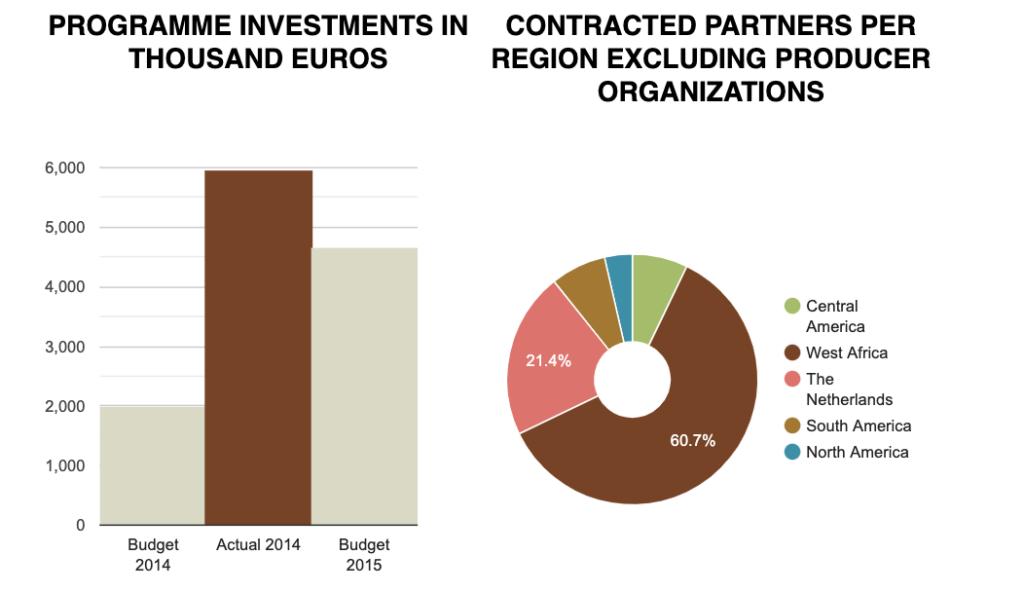
MARKET PARTNERSHIPS
Existing partnerships in sustainable market development were strengthened and new ones were established with Unilever and Marks & Spencer, leading to new programmes in Ghana that focused on young farmers and developing new service delivery models.
In 2014, a strategic cocoa workshop was held for the Solidaridad senior sustainability team in the Netherlands in cooperation with Cargill.
SOLIDARIDAD’S COCOA NETWORK

CHALLENGES AHEAD
Impact assessments made in 2013, as well as external analyses by stakeholders in April 2014 have formed the basis for our new cocoa strategy. The most important elements are rehabilitation – which is mainly driven by the private sector – and strengthening rural service providers. We will need to focus on the next generation of cocoa farmers and address issues such as access to finance, productivity and land size in an integrated manner. Working with private sector partners and national governments, while positioning Solidaridad as a trusted, knowledgeable and innovative partner, is key.
Improving the profitability of cocoa farming is also important, but this issue needs to be addressed at the landscape level. Intensification will not automatically lead to less deforestation. Working with governments and private sector partners across several commodities to put in place the right policies and incentives will be essential to achieve more sustainable agriculture around the world. The first steps towards developing a new landscape approach have been taken in Ghana, Ivory Coast, Brazil and Guatemala.
NEW PARTNERSHIPS GAINING MOMENTUM
The Fruit & Vegetables programme is expanding steadily. Collaboration with companies, retailers and business platforms is gaining momentum, against a background of greater willingness to invest in sustainability. Initiatives in the sector have been developed in various Solidaridad regional offices, focusing on both export and national markets in order to improve food security .
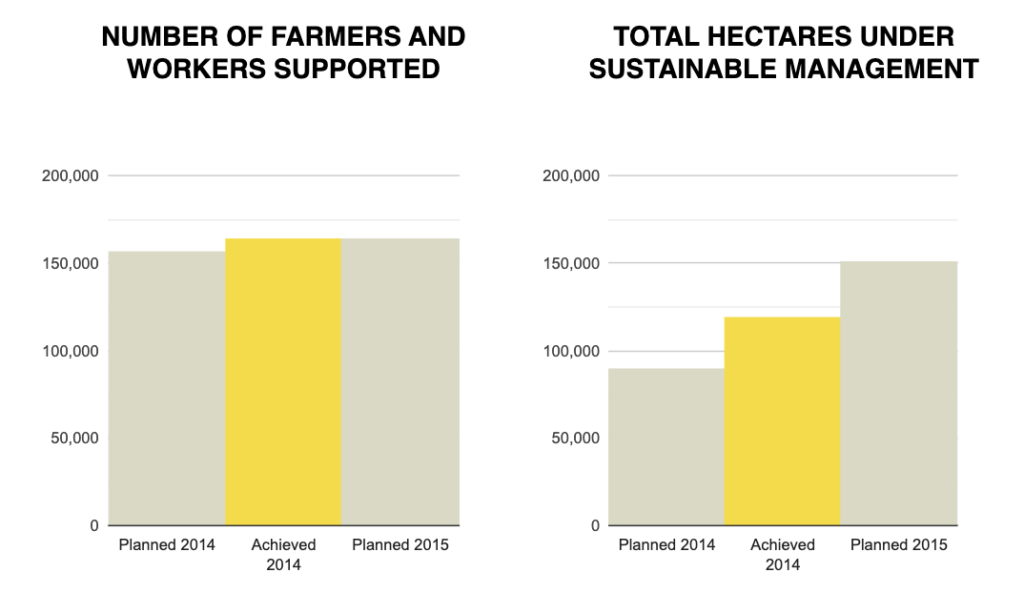
RESULTS
Effective relationships were strengthened in global markets for fruit juice and bananas and there were various initiatives designed to enhance food security. We collaborated with Friesland Campina Riedel on juice, with the World Banana Forum (WBF), IDH – SIFAV, Nestlé and RVO, resulting in projects for bananas in Ecuador and Cameroon, horticulture in Ethiopia and Kenya, citrus in Brazil and mangos in India.
In the juice sector, Solidaridad is developing a bottom-up farmer self-assessment tool, Rural Horizons, with support from Friesland Campina Riedel, Firminich, the Sustainable Agriculture Initiative (SAI) and the European Juice Business Association (AIJN). This tool combines a farmer-centred approach with SAI’s generic criteria. We are also participating in MVO Nederland’s Fruit & Vegetables Working Group on CSR in Small and Medium-Sized Enterprises.
Pests and diseases pose a major threat to sustainability in the banana sector. Widespread use of pesticides and weekly aerial spraying affect both people and the environment. Solidaridad leads a project together with the WBF, banana companies and retailers in order to structurally improve health and safety in banana production in Ecuador and Cameroon. Panama disease, for which there is no cure, is spreading. Due to the disease’s resilience to fungicides, it can wipe out entire species of bananas. Together with the WBF, we are working to prevent further spread of this disease, and we will continue to focus on this issue in the years ahead.
In 2014 we coordinated food security projects in Ethiopia and Kenya together with partners RVO, Ecom, Nestlé and various farmer cooperatives. The budget for this project is over €9 million for a period of seven years. Other food security projects which include fruit and vegetables are running in Bangladesh, Mozambique and Ghana. We will continue to increase our capacity for establishing market linkages, transferring technology and knowledge, and fundraising.
REGIONAL COMMODITY PROGRAMMES
The horticulture project in Kenya has helped to improve standards of living through collaborative partnership with other stakeholders. Our innovative approach was to involve marketing agents to connect farmers to the local market. Access to EU buyers remained a challenge.

In 2014 Solidaridad and leading Dutch dairy producer FrieslandCampina Riedel BV (FCR) launched a four-year, joint programme to improve the sustainability of fruit production around the globe. The orange juice sector in Brazil was identified as a priority target, resulting in the development of a Rural Horizons toolset for citrus.

Solidaridad Netherlands and FrieslandCampina Riedel are working together on more sustainable approaches to two of the latter’s juice brands, making labour conditions and sustainable cultivation the basis for holistic sector transformation.

In 2014, the regional government of Piura passed a decree endorsing the banana technical roundtable, giving the platform a formal role and the support of an administrative office. Solidaridad has been involved in the banana platform in Peru since 2012. The other main participants are five export companies, five trade and import companies, 16 banana producer organizations and four government bodies.

Horticulture is a new product category for Solidaridad Southern Africa. The first project was implemented in 2014 and two more have been approved for 2015. All three projects have the common goal of improving access to formal markets.

IMPACT
In the banana sector in Peru, we broadened our scope from developing a farmer-owned export business initiative towards a pre-competitive sector-wide initiative. We played a leading role in developing a platform in which 16 banana farmers’ organizations, four government agencies, three export companies, three import companies and four NGOs are involved. This platform, which was established to identify sustainability issues related to water and pests, is providing solutions for the Peruvian banana sector as a whole.
In the horticultural sector in Kenya, training materials were developed and farmers were trained in Good Agricultural Practices, group dynamics, financial management and enterprise development. A range of methods were used to deliver these courses, including organizing field days, demonstrations, exchange tours, and lead farmer models. For most of the crops grown by farmers under this programme, marketing linkages were enhanced. For French beans, sugar snaps and snow peas a number of the business partners continued to sell to their clients in EU, as well as in the Middle East and Asia. For chilies, new markets were sourced both in the EU and in Asia. New markets were also developed for local crops, including Uchumi Supermarket, Tru Foods Ltd, while linkages were established with local marketing agents for various crops.
In South Africa, farmers were trained to produce green mango achar in partnership with Selbourne Food Manufacturers. After an initial proof of concept, a larger intervention was prepared. In that context, cooperation was established with a local standards organization (SIZA) as well as engagement with national retailer Woolworths.
These examples show that the active involvement of partners in the supply chain is important for success. We believe that such partnerships throughout the supply chain in the fruit, banana and vegetable sectors offer the best way to transform the sector.
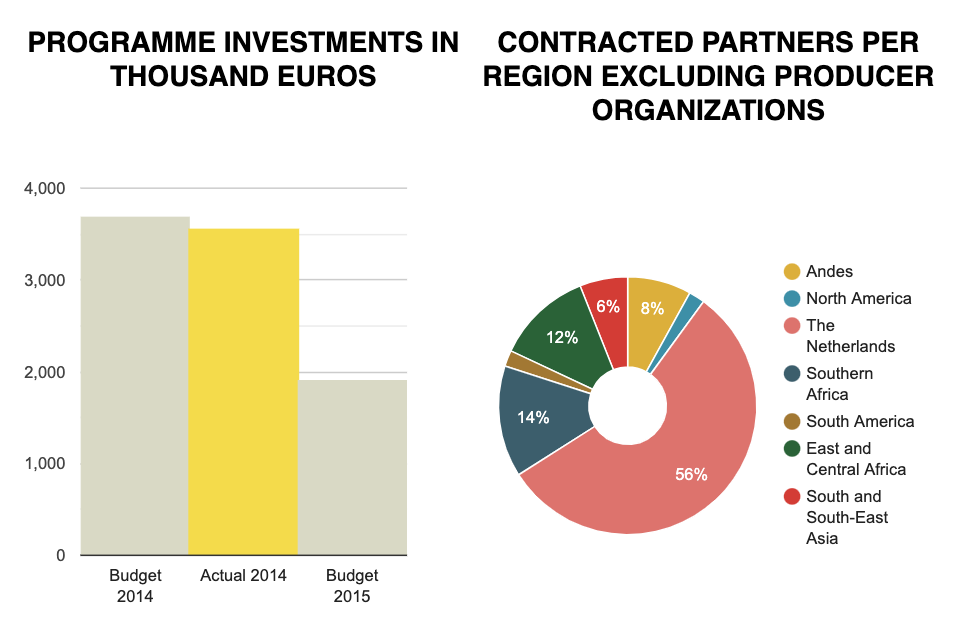
MARKET PARTNERSHIPS
Solidaridad Netherlands established a multi-year partnership with Friesland Campina to increase supply chain sustainability for two of its most visible brands: CoolBest and Appelsientje. This partnership is in line with our sustainability goals, as it involves improving cultivation techniques as well as working conditions for farmers and workers. The SAI platform and AIJN have committed to projects designed to develop sustainable citrus growing in Brazil.
Traders, retailers and NGOs that have signed the covenant for sustainable F&V are developing projects to improve the sustainability of production in developing countries. The World Banana Forum, a multi-stakeholder sector platform, is now also linked.
Solidaridad is a member of the executive committee of the World Banana Forum. Leading banana companies such as Chiquita, Dole and Fyffes are also members alongside retailers such as Tesco. We are working with these partners on a project designed to improve health and safety on and around banana farms.
Unilever and Soldaridad Netherlands have signed a joint business development agreement covering various commodities, including fruit. This agreement, which is their first overarching agreement with an NGO, has the potential to improve the livelihoods of a million small-scale farmers (including women) as well as farm workers in Unilever’s supply chain.
SOLIDARIDAD’S FRUIT & VEGETABLES NETWORK

CHALLENGES AHEAD
Fruit and vegetable production – with a focus on supply for local and regional markets – is becoming increasingly important. The interventions needed vary according to the context. We aim to develop effective methodologies and instruments that can support such initiatives and that can be adapted to local circumstances. Furthermore, we mobilize technical knowledge and access to high-quality inputs in order to strengthen F&V production systems.
Banana companies are facing difficult times. Their bargaining position in relation to retailers has deteriorated in recent decades. In response we are encouraging retailers to commit to sustainability in the banana sector.
Fruit growers often produce for the fresh fruit market and the fruit processing industry. Left-over fruit is then often sold to the juice industry. This is why we intend to align our initiatives in the fruit juice sector with those in the fresh fruit sector.
COTTON’S SUSTAINABLE NETWORKS
At the core of Solidaridad’s work in cotton has always been farm-level improvement. In 2014, Solidaridad reached 162,000 farmers, linking them to the supply chains of 14 major brands that value sustainable sourcing.
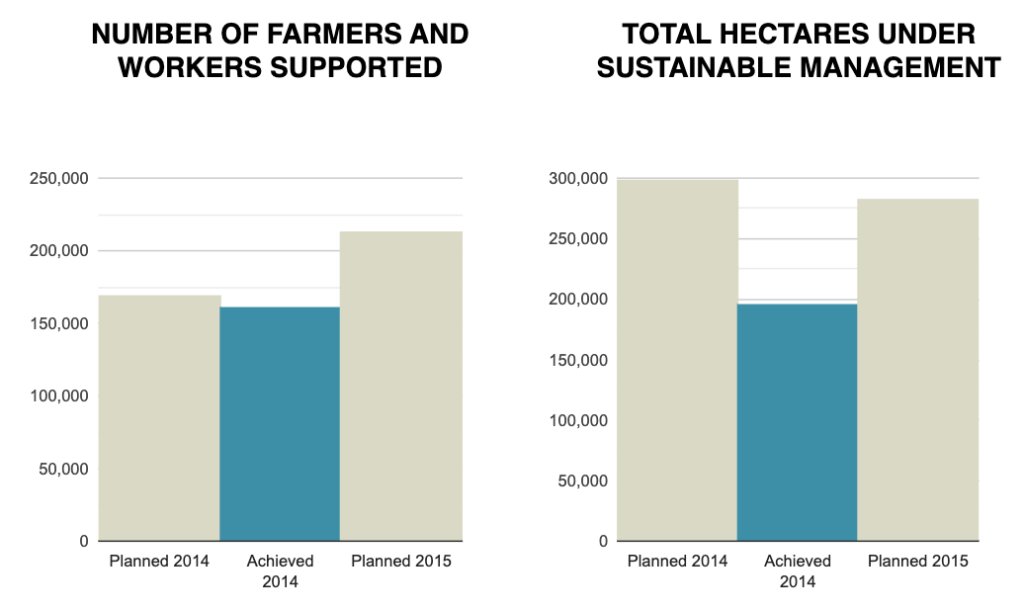
RESULTS
Cotton cultivation continues to take an environmental as well as a social and an economic toll. Health issues resulting from the use of pesticides, water scarcity, poor labour conditions and poverty indicate the urgent need for effective solutions. Our response centres around an integrated approach, linking supply chains, brands and retailers and acknowledging the increasing demand for sustainable cotton as well as the position of brands and retailers as channels of change.
While new projects were initiated in Senegal and Kenya, our focus in 2014 was on consolidating existing projects. These were expanded, farmer groups in Tanzania and India moved forward with self-reliance strategies, and the first Chinese Better Cotton Initiative (BCI) small farmer project was licensed for Better Cotton. This project prepared farmers in Julu County, Hebei Province for access to markets, while encouraging sustainable growing methods as well as quality of life for women and children through workshops on health, education and culture. Overall, Solidaridad’s cotton programme reached over 162,000 farmers in 10 countries.
REGIONAL COMMODITY PROGRAMMES
- NORTH AMERICA
- SOUTH AMERICA
- SOUTHERN AFRICA
- THE NETHERLANDS
- CHINA
- WEST AFRICA
- EAST & CENTRAL AFRICA
- SOUTH & SOUTH-EAST ASIA
Women play a pivotal role in cotton growing. Their wellbeing and understanding of best practices is vital to the success of Better Cotton Initiative (BCI) cotton. Solidaridad has increased the number of women participating and in leadership roles in China through ongoing BCI projects.

The Rural Horizons online self-assessment guide was distributed to and completed by 192 small cotton farmers linked to cooperatives. Data from 229 producers has been combined with the feedback from a first round of surveys in 2013 in a single database available for group analysis and 229 individual road maps have been generated.

Solidaridad Southern Africa has been actively supporting initiatives that promote sustainability and increase cotton production in Mozambique and Zambia. On the demand side, the decision of Woolworths (a key retail brand in South Africa) to become a member of the Better Cotton Initiative (BCI) will help to strengthen sustainable supply chains in cotton in Africa.

Solidaridad Netherlands and partners have worked to increase the uptake of sustainable cotton in European markets and made progress towards a fully sustainable cotton sourcing industry.

Solidaridad has helped to pave the way for Better Cotton Initiative (BCI)-certified cotton in China. After overseeing the first verified cotton in 2012, we launched China’s first project for smallholders in 2013, leading to the first smallholders in China receiving BCI certification in 2014. Solidaridad is now looking beyond certification towards making a significant investment of effort in innovation and technology.

Solidaridad West Africa’s cotton programme is focusing on building the capacity of the African Cotton Producer’s Organisation (AproCA) to become a strategic partner for the Better Cotton Initiative (BCI) in West Africa.

The cotton programme embraced global strategic approaches in its implementation. Marketing significantly affected cotton production and expansion. Scoping studies, surveys, the development of road maps and national stakeholder forums, were all strategies deployed in the region.

In 2014, the textiles programme for REC SSEA underwent a process of consolidation and transition, which had a profound influence on the strategy by encouraging a more pragmatic approach with regards to new programmes.

IMPACT
Farm-level achievements are key indicators of progress. Reduced pesticide and water use was achieved alongside increases in productivity. For example, in Mozambique under the BCI, farmers almost doubled previous yields of cotton per hectare.
Strong smallholder farmer groups are hard to find in organic cotton production and therefore still need to be built in many regions. An external evaluation of the ProCotton programme – supported by CFC/ICAC – found that Solidaridad’s efforts have assisted the Tanzanian project BioSustain substantially. We have helped the organic cotton company consolidate considerably by building their capacity to deliver quality extension services to better organized farmers, by improving their access to finance, which has been instrumental in allowing them to start a ginning operation, and by establishing connections with international players.
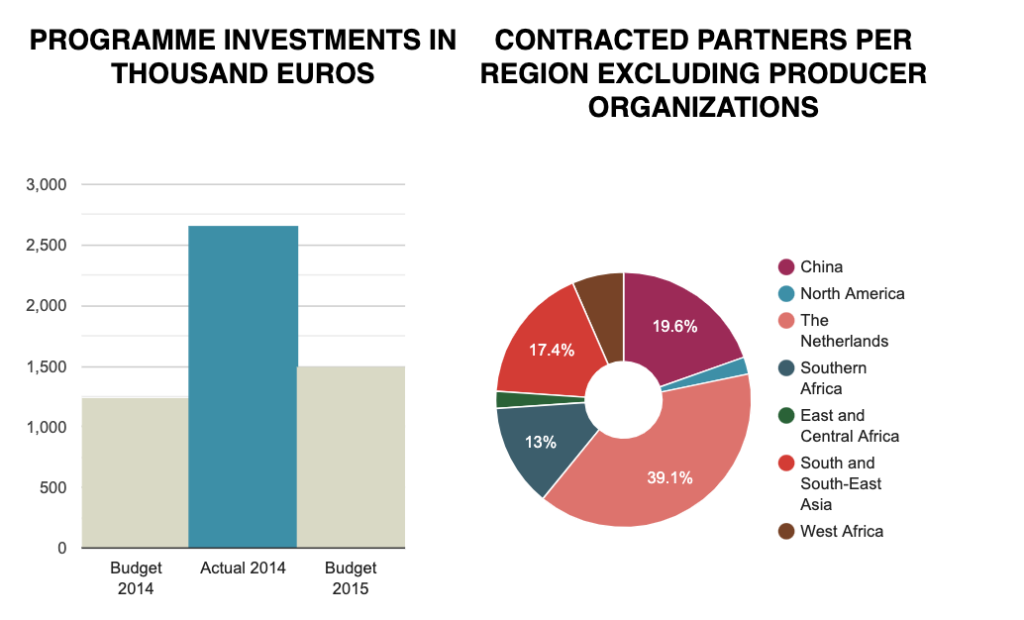
MARKET PARTNERSHIPS
Brands and retailers remain the principle actors in the cotton supply chain. They are ideally placed to start ripple effects, transforming their own value chains, as well as acting as exemplars for other companies. In 2014, Solidaridad partnered with companies representing 14 brands, including with the VF Corporation, which owns leading brands such as Wrangler Jeans, The North Face and Timberland. In particular we worked together in Julu County, China helping smallholder farmers produce Better Cotton using BCI principles.
SOLIDARIDAD’S COTTON NETWORK

CHALLENGES AHEAD
Our farm-level work has had a significant impact on helping farmers to meet demand for responsible clothing. However, while there is growing demand on the consumer side, uptake of sustainable cotton by brands remains slow. It’s our challenge to ensure that it increases in the years ahead, as brands and retailers continue to more closely analyse their sourcing strategies.
With economic, infrastructure and capacity drawbacks becoming apparent in traditional cotton cultivation and production centres, such as those in Asia and Africa – particularly in Ethiopia which has emerged due to the availability of raw cotton, a skilled workforce and a growing economy. The first brands began sourcing in Ethiopia in 2014, running the risk of rapid growth at the expense of people and the environment. In this fast developing market Solidaridad faces the challenge of making cotton both profitable and sustainable for producing communities.
MILLS OF FORTUNE
In 2014 Solidaridad rolled out its programme on cleaner production in the textile wet processing industry. Partnerships with H&M, C&A, G-Star and others have led supply factories and mills to substantial reductions in water and energy use.
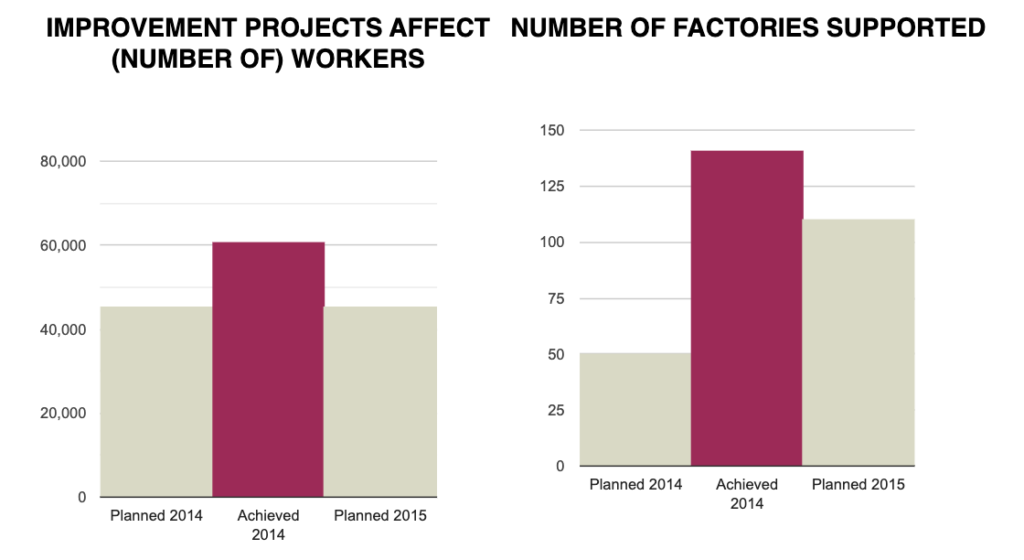
RESULTS
India, China and Bangladesh remain the top textile-producing countries and demand for clothing is increasing. We concentrate our efforts on these production centres and their crucial labour and environmental issues. With a keen eye on brand and retailers’ influential roles in fostering sustainability, we work throughout the supply chain with textile mills and factories, providing training, skills and capacity building and technical support.
Our wet processing work in Bangladesh and China covers hundreds of mills linked to brands such as H&M, C&A and Primark. Reducing the use of water, energy and hazardous chemicals – which affect occupational health and safety and living conditions in surrounding communities – is a core objective. Through brand and retailer HQ-level training and a decision-support guide jointly developed with MADE-BY, we have been able to emphasize social commitments and help develop and monitor H&M’s Fair and Living Wage policy.
REGIONAL COMMODITY PROGRAMMES
Solidaridad has developed an intervention strategy to convince Chinese textile factories to shift their focus from being extremely cost conscious and prioritizing short-term visible benefits to investing their capital in real change.

In 2014 the textiles programme for REC SSEA underwent a process of consolidation and transition, the effect of which was to steer our strategy towards a more pragmatic approach with regard to new avenues of work.

Solidaridad Netherlands and H&M have announced a strategic partnership for sustainability in the textile supply chain, illustrating how business and civil society can combine their resources to tackle problems facing the fashion industry.

IMPACT
Our global textile programme provides solutions to the overuse of water, energy and chemicals in textile mills. For the Better Mill Initiative (BMI), a Chinese mill reduced energy output and achieved 35% re-use of water. BMI mills are implementing changes that we have recommended, sharing results through the Higg Index, which makes benchmarking and fine-tuned sustainability assessments possible. Our BMI results were also highlighted at a Sustainable Apparel Coalition conference in Vietnam. Sharing best practices remains critical to sector transformation.
Despite these positive results, a number of issues stand in the way of sustainability. Fragile brand-mill relations, Chinese relocation policies – which discourage factories from investing in current locations – as well as the need to optimise intensive BMI programmes are just a few of the challenges. Supporting and training suppliers in self-assessing their progress allows us to scale our programmes, while making them more efficient.
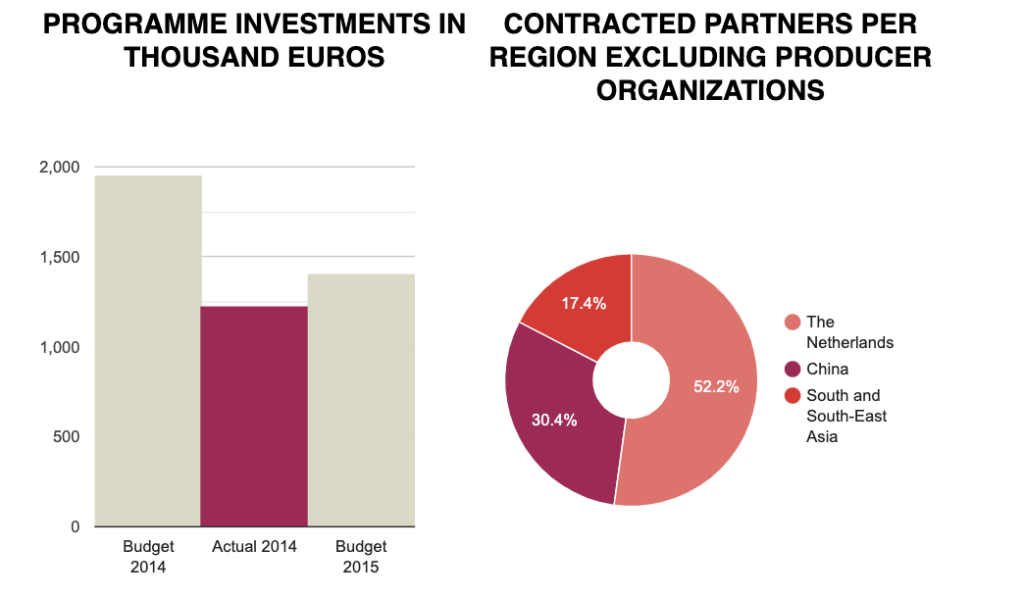
MARKET PARTNERSHIPS
As demand for cheap clothing continues to grow, the key players in the textiles value chain remain brands and retailers, through which Solidaridad influences mills, factories and producers. Twelve brands, including H&M, partnered with Solidaridad in an attempt to increase textile value chain sustainability.
We strengthened our relationship with H&M by announcing a strategic partnership designed to achieve production-chain sustainability in cotton, water, labour conditions, fair wages and transparency during an Amsterdam event which also saw the release of H&M’s Sustainability Report and the launch of its Conscious Clothing Collection.
Targeting mills that process fabrics is important for greater production efficiency and we have used our BMI programme to address such issues, for example at a Sustainable Apparel Coalition conference in Vietnam which involved most of the important players in the textile industry in that country.
SOLIDARIDAD’S TEXTILES NETWORK

CHALLENGES AHEAD
We believe our comprehensive approach to textile supply chain sustainability will continue to change the industry. Programmes already have the support of major brands such as H&M, Primark, C&A and G-Star, but we need to engage with more leading global brands, both medium and large, to achieve true sector transformation. Developing programmes from pilot to mainstream requires new modules and strategies that will drive large-scale adoption by mills and factories, and this will be a priority in our textile programme in the years ahead.
NEW MINES AND MARKET PARTNERSHIPS GOOD FOR GOLD
In 2014 we celebrated a number of milestones and added new mines and market players as partners. We worked with the international luxury brand Gucci to source the single largest purchase of certified gold to date (Fairmined gold from the SOTRAMI mining community in Peru) – a commitment which we expect will grow in the years ahead.
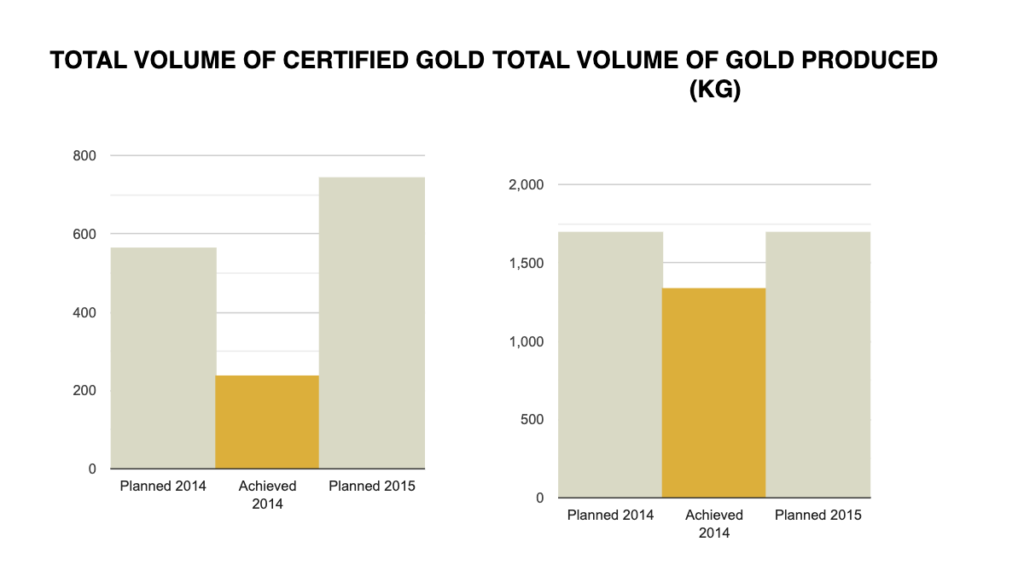
Planned 2014Achieved2014Planned 20150200400600800Achieved 2014237
| Planned 2014 | 564 |
| Achieved 2014 | 237 |
| Planned 2015 | 744 |
TOTAL VOLUME OF GOLD PRODUCED (KG)
Planned 2014Achieved2014Planned 201505001,0001,5002,000
| Planned 2014 | 1,700 |
| Achieved 2014 | 1,335 |
| Planned 2015 | 1,700 |
RESULTS
Thanks to support from the Cartier Foundation, we doubled the scope of our work in Ghana, with plans to include five new mining communities in our improvement programme.
At the mine level, we are proud to report the certification of Minera Yanaquihua, a pioneering small industrial mining company in southern Peru. This mine, which achieved certification to the Responsible Jewellery Council standard, is the only mining company in Peru to earn this distinction for responsible operation. Solidaridad and Minera Yanaquihua have worked together for over three years, both at the company’s operations and in nearby communities of artisanal miners.
Also in Peru, we published a guide that will help small-scale miners move into the formal economy and meet national environmental and social regulations. Formalisation is the first step on the path to certification.
In Ghana, three small-scale mining associations – the first in Africa to get involved in our improvement programme (in 2013) – have nearly completed their path towards certification. They are expected to apply for Fairmined certification in 2015.
In the Netherlands, we have been busy planning a consumer campaign that tells the stories of individual miners in Ghana striving for better practices alongside stories of Olympic athletes who have worked hard to “win gold.”
REGIONAL COMMODITY PROGRAMMES
Minera Yanaquihua, a small gold mining company in southern Peru, has been a pioneer in achieving Responsible Jewellery Council (RJC) certification in responsible mining. After three years of continuous improvement, supported by Solidaridad, RJC certification is an important milestone for Minera Yanaquihua that shows how small to medium gold mines can succeed by following responsible business practices in gold extraction and processing.

Two years ago the town of Misa Rumi was mostly inhabited by older women whose children were forced to migrate to distant cities for work. Today the opportunity to engage in ecological gold production is drawing young people to the area.

Social, economic, and environmental issues run deep in gold mining. Solidaridad Netherlands’ partnership with Kering brand Gucci has facilitated the purchase of 30kg of responsible gold from Peru— the largest single sale of certified, fully traceable gold to date.

The gold project in Kenya’s Migori and Kilgoris counties, which is funded by UK charity Comic Relief, has generated global interest. This required artisanal miners to be trained in health and safety. A regional conference was held in Geita, Tanzania, to share opportunities, experiences and lessons learnt in the first two years of the project’s implementation.

Solidaridad’s gold programme in West Africa facilitates the transition of Ghana’s small-scale mines toward certification. Dakete Small Scale Company Ltd, Kyereyiaman Cooperative and Golden Resources are three mines on the verge of obtaining the Fairmined certification.

IMPACT
Since 2009 we have assisted over 5,400 miners in eight countries in improving their practices. In 2014 we continued measuring the impact of our work with miners in the gold sector. We began three evaluations – two in Ghana and one in Peru – which will be completed by independent evaluators to ensure their credibility. This work will continue through 2015, when we plan to report on progress and how we can further strengthen our approach in the years to come. We aim to share these lessons broadly so that others can learn from our experience, replicating successes to move the sector more quickly towards responsible practices.
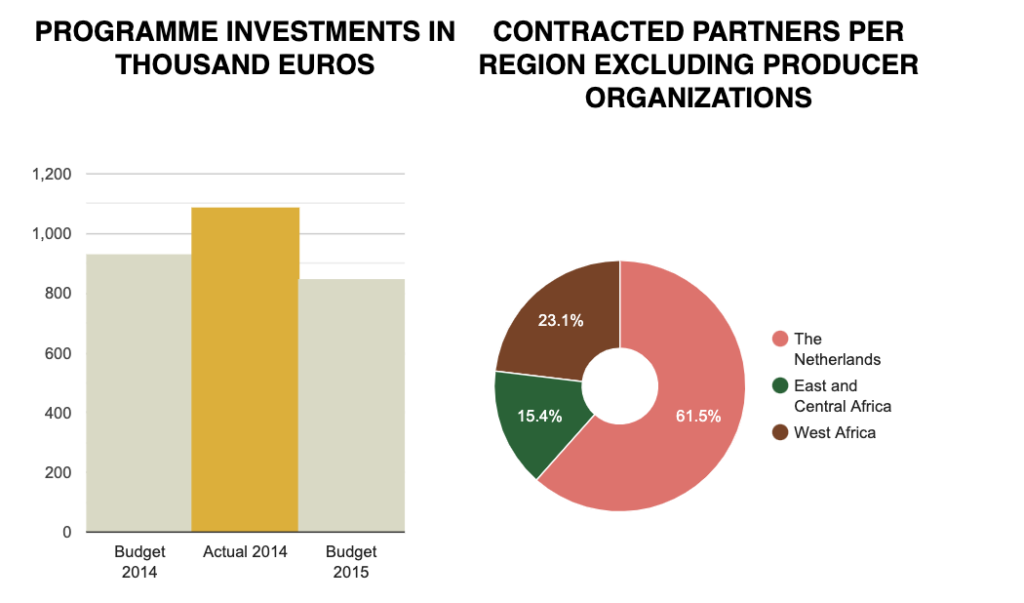
MARKET PARTNERSHIPS
Support from gold buyers (brands, refiners and traders) is essential to our goal of mainstreaming sustainability in the gold value chain. As our partners in this transition, they bring the leverage that will lead to real change. In 2014 we worked with Gucci and Cartier Foundation on responsible production and sourcing projects. We also continue to work behind the scenes with a variety of European and international brands, refiners and traders to encourage them to buy from certified, responsible mines. We are also planning innovative projects together with these companies that go beyond certification. These companies are expected to make announcements in 2015, together with Solidaridad. Stay tuned! The Netherlands is home to Solidaridad’s European office, so we are happy to announce that in the past two years, the number of jewellers buying certified gold has grown from 10 to over 40.
SOLIDARIDAD’S GOLD NETWORK

CHALLENGES AHEAD
The big challenge for Solidaridad and its partners in the next five years is scaling up successful pilot projects, setting the stage for mainstreaming responsible practices in the long term. To do this, we will engage with other potential partners, e.g. those from the financial and electronics sectors. Both as buyers of gold, but also, for the financial sector, as providers of appropriate investment to mining organizations that are committed to continuous improvement. We will use the results of our evaluations to demonstrate the benefits of our approach to gold buyers. Further, we will use lessons learned to encourage decision-makers in gold-producing and gold-buying countries to adopt policies that support best practices. This is because mining policies, though well-intentioned, may work against sustainable development in mining communities. In 2015 and beyond, we expect to engage with an even wider range of stakeholders to achieve our goals.
BRINGING CHINA INTO THE SUSTAINABILITY ARENA
For more than 10 years, we have been working on improving the sustainability of soy production with producers in South America, Asia and Africa. In 2014, we supported 111,728 soy producers working on 581,747 hectares in nine countries
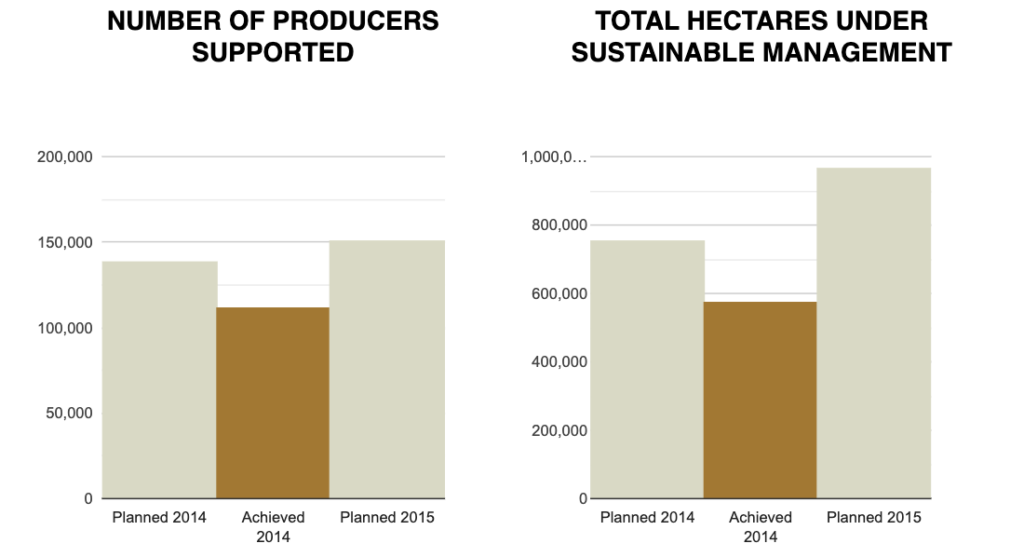
RESULTS
The results give an indication of the scope of our programme, but what we consider to be even more important is the social and environmental impact and scalability of our approach. In India we now see companies in the soy sector copying our approach, with tens of thousands of farmers inviting us to join them as a knowledge partner.
REGIONAL COMMODITY PROGRAMMES
With the first Round Table on Responsible Soy (RTRS)-certified soy in China, Solidaridad is developing a strategy focusing on the demand side. Our approach is to convince soy importers to adopt responsible procurement policies by engaging not only with China’s top soy importers, but also with players further along the supply chain such as Unilever, McDonald’s, Procter & Gamble (P&G), and representatives of the government and financial sectors.

The Chaco is experiencing the most rapid deforestation of any ecosystem in South America. Solidaridad North America, in partnership with Solidaridad South America, is building consensus to support an alternative development path for the livestock sector.

The main issues facing Indian smallholder soy farmers are weak infrastructure, illiteracy, lack of organization and resources, managing small land holdings, and water scarcity. Solidaridad has been working with these farmers to support them in adopting new technologies.

The RTRS (Round Table for Responsible Soy) standard is new to Africa. Solidaridad is involved in promoting RTRS methods through two projects in Mozambique and Malawi. As a result farmers in Mozambique have seen a substantial increase in yields, while in Malawi approximately 38,000 farmers have received certified soybean seed.

As a result of years of advocacy by Solidaridad and other NGOs, increasing numbers of European companies are committing themselves to buying certified soy. But there is much work still to do.

With the biggest producer companies in the region committed to integrating sustainability targets into their business plans, Solidaridad is aiming to bring almost 1 million hectares under sustainable management.

IMPACT
One impact study carried out by an external consultancy examined good practices among 2,500 small-scale producers in Bolivia. This evaluation showed that the project resulted in cultural change, with sustainable management as a viable option. And it suggested that this approach to promoting good practices is replicable in other areas of Bolivia and in other countries around the world.
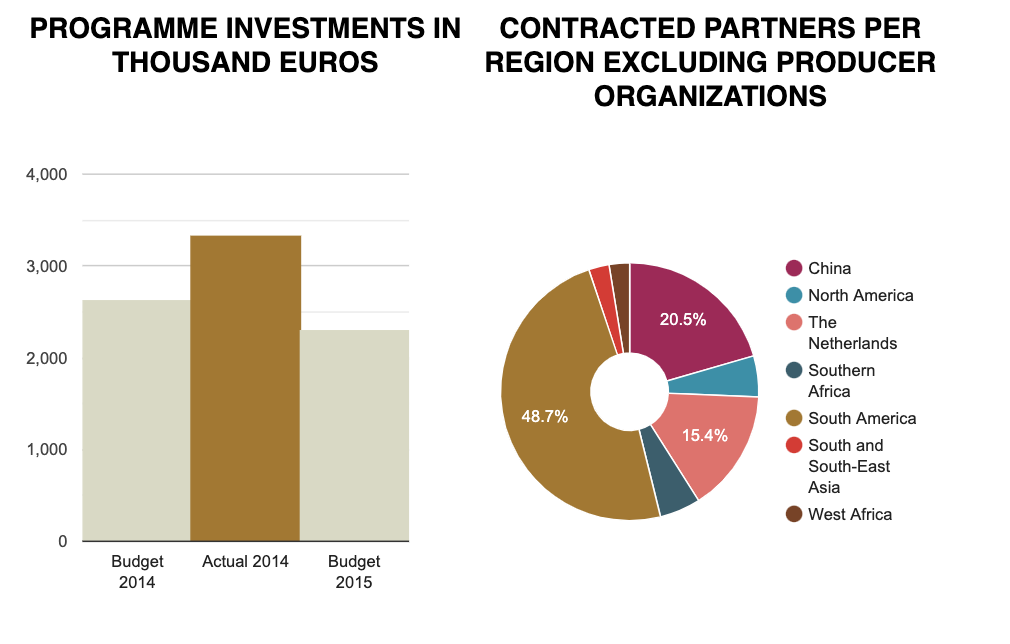
MARKET PARTNERSHIPS
Our most important long-term market partner is UK and multinational retailer Marks & Spencer (M&S). M&S is considered to be a strategic partner and it supports our soy smallholder programme in Eastern Paraguay, in cooperation with UNICOOP, the umbrella organization of soy family farmers in Paraguay. We are also working together with Unilever to improve the sustainability of soy and to ensure that all soy used in the Unilever supply chain is under RTRS certification.
SOLIDARIDAD’S SOY NETWORK

CHALLENGES AHEAD
With a limited role of brands, the increasingly important role of emerging countries (China buys two-thirds of all the soy on global markets) and a limited willingness by companies to pay for sustainability, it’s clear that more than just certification is needed. It is therefore of utmost importance to bring China into the international sustainability arena. Together with other NGOs, Solidaridad REC China started the China-South America Responsible Soybean Platform, with the challenge of mobilizing the Chinese market for sustainability. We are also actively developing new approaches, for instance by using Rural Horizons as self assessment too and by designing a landscape programme in Northern Argentina.
MARKETS SUPPORT SMALLHOLDER INCLUSION
Companies increasingly invest in palm oil traceability to reassure consumers. An unforeseen negative consequence may be that smallholders are cut out of supply chains, as they don’t have full control over the destination of their crop. Solidaridad works with producers and supply chain companies to develop inclusive sustainable palm oil supply chains.
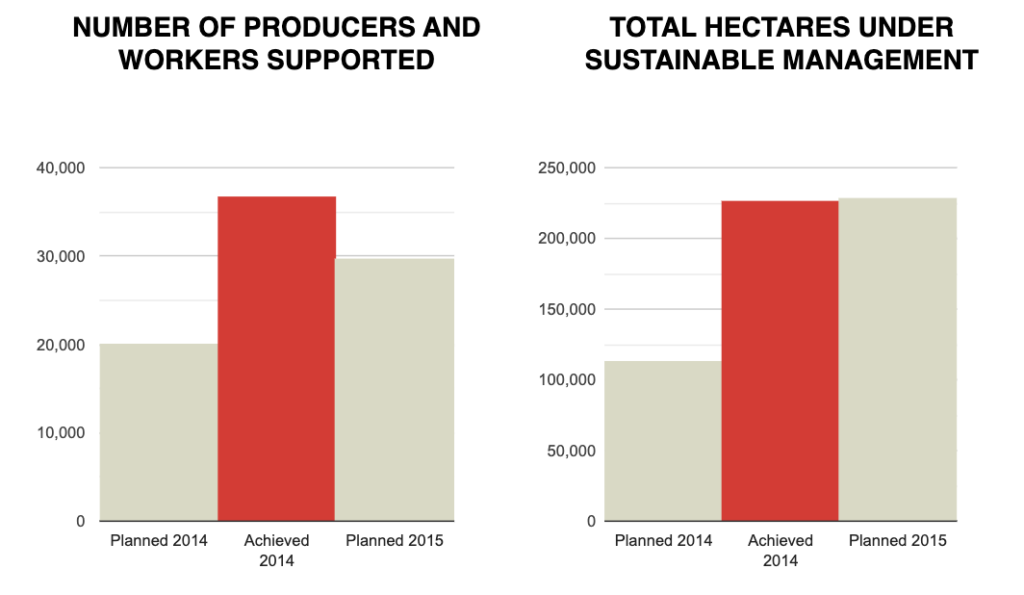
RESULTS
More and more countries and companies are committing to sustainable palm oil. In 2014, several national market transformation initiatives were established across Europe. In Asia Solidaridad created a platform to facilitate the debate between companies and governments on a transition to sustainable palm oil for Asian markets, which consume more than 75% of global palm oil. At the global level, Solidaridad continued to work with the Roundtable for Sustainable Palm Oil to develop this into a community of change that is inclusive for smallholders.
Partnerships with leading global consumer companies such as Unilever, Henkel and Johnson & Johnson were strengthened. These companies – together with over 70 local palm oil mills, RSPO and the Dutch government – enabled Solidaridad to support almost 37,000 farmers and workers. Our innovation programmes demonstrate sustainable production, promote smallholder inclusion and improve working conditions.
REC CAM aims to bring about continuous improvement in agricultural and industrial production processes, as well as social and labour conditions, through certification. We have focused on increasing productivity to prevent production areas expanding at the expense of food production and forested areas. This primary strategy has helped convert more than 40,000 ha of oil palm in Honduras and Guatemala to sustainable management practices.

Palm oil smallholders in Indonesia are struggling to keep pace with the growing global demand. Average yields for the country’s 1.5 million smallholders are 2.5 metric tonnes per hectare, compared to the national average of 4 tonnes. Increasing productivity has the potential to double their income without causing deforestation.

Partner organizations ADM and Agropalma are increasingly moving towards sustainability certification, creating opportunities to play a role in their smallholder suppliers’ development and contribute to social and environmental compliance, while creating rural employment and significantly raising household revenues.

Four countries – India, China, Indonesia and Malaysia – produce and consume 80% of the world’s supply of palm oil. In 2013 Solidaridad SSEA took over the management of the palm oil programme in the region. Since then the REC has shifted its main focus from Roundtable certification to supporting smallholder palm oil producers and sustainably transforming Asian palm oil markets.

Good labour practices are integral to the creation of sustainable supply chains. Solidaridad Netherlands and Verité have begun developing a labour-audit toolkit to improve the implementation of Roundtable on Sustainable Palm Oil (RSPO) criteria.

In June 2014, 20 companies in the palm oil sector formally joined the Sustainable Trade Platform in Colombia, managed by Solidaridad. All participants signed a voluntary commitment to work towards the development of a sustainable palm oil sector in Colombia. Among the signatories were 20 of the most significant palm oil companies, the Deputy Minister for Agriculture and Rural Development of Colombia, and the Ambassador of the Netherlands.

As the world looks to West Africa as the new frontier for increasing global supply, the Sustainable West Africa Palm oil Programme (SWAPP) is exploring how to increase productivity and profitability of the producers in the region.

IMPACT
No impact assessments were carried out in the palm oil programme in 2014. In early 2015, mid-term reviews for both the Global Farmer Support Programme and the Sustainable West Africa Palm Oil Programme will be conducted.
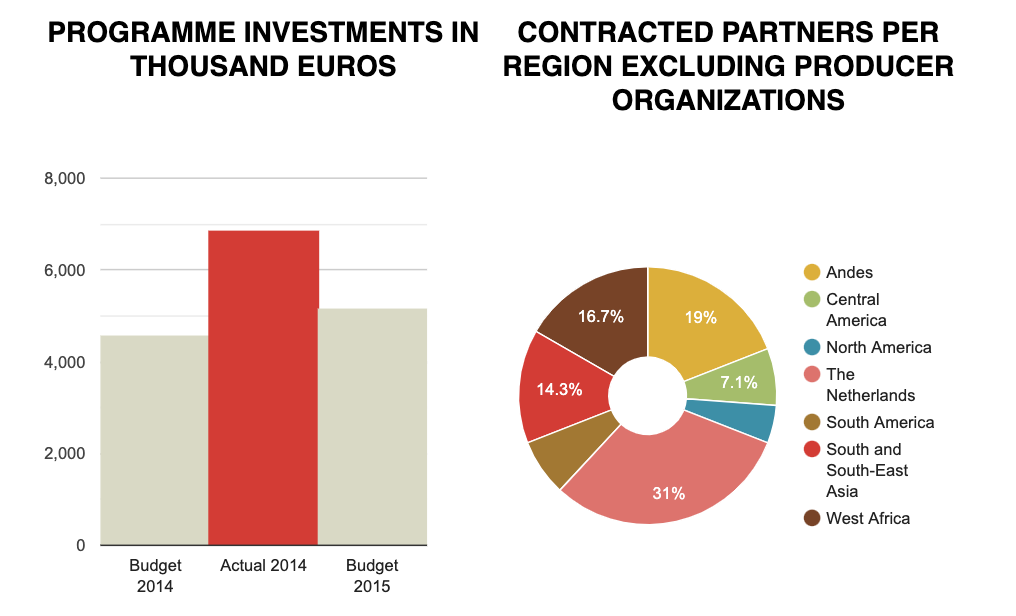
MARKET PARTNERSHIPS
Less than one percent of available RSPO palm oil comes from independent smallholders, who are responsible for 15-30% of global output and because of their lower yields may occupy as much as 40-50% of the planted area. To ensure that smallholders participate in the transition towards sustainable palm oil, we worked with Henkel and Johnson & Johnson to pioneer investment in independent smallholder certification. In 2014, all certificates issued to independent smallholders in the Solidaridad portfolio were sold.
In 2014 Solidaridad launched its partnership with Unilever, with an ambitious inclusion agenda in five global supply chains including palm oil. The October 2014 visit of Dutch foreign trade minister Ploumen to China included a round-table meeting with Chinese investors, traders and processors of palm oil, resulting in a process that is intended to stimulate the uptake of sustainable palm oil in China, the world’s second biggest market.
Solidaridad co-chaired the Smallholder Working Group of RSPO and was on the panel of the RSPO Smallholder Support Fund, which approved its first four grants for independent smallholder groups working on RSPO compliance.
SOLIDARIDAD’S PALM OIL NETWORK

CHALLENGES AHEAD
The supply of and demand for sustainable palm oil is increasing rapidly, but the sector is growing so fast that the percentage of non-certified palm oil remains steady at about 80%. Additional government and industry policy measures are thus needed to curb the potentially negative impacts of palm oil expansion. Solidaridad will intensify its engagement with governments and national sector organizations, while supporting the development of such organizations where they don’t exist, as in Ghana. Current grant-based approaches can involve thousands, but not millions of smallholders and workers in the sector. To address the challenges all these farmers face when they have to comply with sustainability policies – including providing decent pay and conditions for their workers – new education and business models are needed. Future revenues can increasingly pay for investments in a transition to sustainable production, and we are cooperating with farmer groups, a credit union, mills, brands and impact investors to develop mechanisms which we hope will make this work.
HOW TO HIT A SWEET SPOT IN INDIA
A public-private partnership that supported the livelihoods of 56,065 sugarcane growers across India in 2014 is attracting a lot of attention. This is no surprise, with yield improvements of more than 10% and water savings of 30 billion litres per year. A new project will push the limits of demand-side water savings in sugarcane cultivation even further.
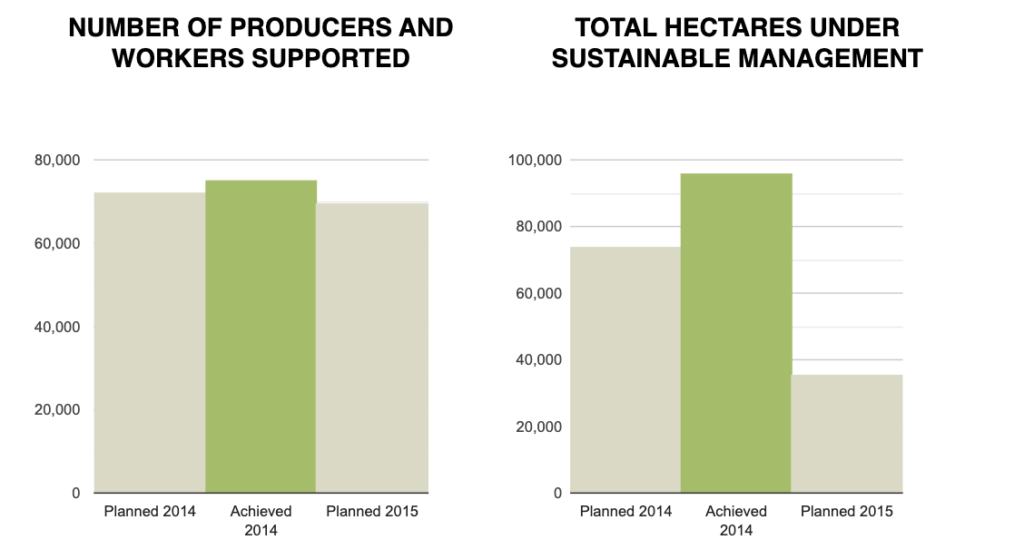
RESULTS
Solidaridad’s global campaign How To Change The World With Sugarcane was highly effective in engaging stakeholders in a debate on sustainable sugarcane. It provided a narrative that was appealing to companies and it served as a platform for communicating the message that change is not only necessary but also possible.
Solidaridad is working with Raízen in Brazil, one of the world’s largest sugarcane millers. The aim is to enable the mills to be better able to support third-party cane suppliers while helping them to reach compliance with the Bonsucro production standard. At Solidaridad we are using our Rural Horizons network programme as an expert system to do this in a way that helps growers as well as the mills.
REGIONAL COMMODITY PROGRAMMES
- CENTRAL AMERICA
- EAST & CENTRAL AFRICA
- SOUTH AMERICA
- SOUTHERN AFRICA
- THE NETHERLANDS
- SOUTH & SOUTH-EAST ASIA
Solidaridad’s work in the sugarcane sector is moving from pilot sustainability projects in Mexico to broader and deeper engagement across the region. Our efforts to understand, contain, and start to eradicate chronic kidney disease earned worldwide acclaim, while beyond the mills we are implementing grassroots interventions with sugarcane cutters in Mexico and El Salvador.

Solidaridad participated in the online campaign How to Change the World With Sugarcane”. We implemented our project in Tanzania using the sustainable management tool (SMT), with support from Solidaridad Southern Africa. The SADC sugar protocol was the preferred standard system for training farmers on sugar production in Tanzania.

The partnership between Solidaridad and Raízen (a joint venture of Cosan/Shell), the largest sugar and ethanol company in the world, has taken a big step forward with the launch of ELO, its new sustainability programme aimed at its 3200 independent suppliers.

Southern Africa produces 75% of the continent’s sugarcane both by large and small-scale producers. Solidaridad Southern Africa’s efforts in 2014 focused on Malawi and Swaziland, with more than 1700 farmers adopting our sugarcane production principles. New projects will start in 2015.

La Isla, in Nicaragua, is known as the Isle of Widows because of the prevalence of chronic kidney disease, which disproportionately strikes sugarcane cutters. Solidaridad is running a three-year project, backed by the Dutch Postcode Lottery, to end this disease and secure a future for these communities.

Solidaridad has joined forces with the International Finance Corporation (IFC), Hindustan Unilever Foundation (HUF) and four Indian milling companies in a joint programme that aims to improve farm productivity and smallholders’ income. The programme helps farmers adopt water efficient agronomical practices while also building on their financial and farm input management skills.

IMPACT
The Harvard Kennedy School published a comprehensive report entitled “Collaborating for Change in Sugar Production,” which presents five building blocks for creating a more sustainable global sugarcane sector. Solidaridad was identified as a key player to work on four. The building block that is missing is policy and regulatory support, an issue which Solidaridad intends to focus on more in the next few years.
Solidaridad, together with the International Finance Corporation and Royal Dutch Shell, commissioned a study to better understand the business case for compliance with – and certification to – the Bonsucro production standard. It showed that operational benefits related to moving towards compliance justified the investments required. Mills which are at the level of legal compliance have a payback period of less than two years, while other mills substantially reduce their exposure to fines.
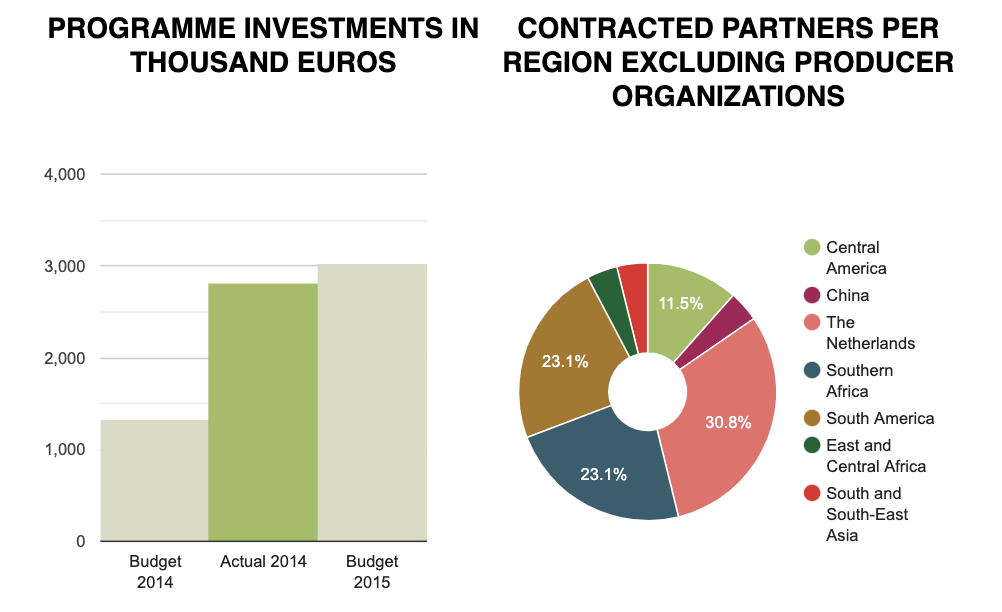
MARKET PARTNERSHIPS
Solidaridad works with 27 mills around the world to help them improve their performance. We create interventions that support them in dealing with business challenges through the paradigm of sustainability. Mills are often the critical factor in determining impact on the ground.
Sugarcane is also part of the strategic partnership between Unilever and Solidaridad. We support Unilever suppliers in both Mexico and India to improve their production and get certified against the Bonsucro production standard. In the latter country, our support is part of a public-private partnership programme with the International Finance Corporation.
Solidaridad continues to be a proud member and supporter of Bonsucro, which operates the world’s leading standard in the sugarcane space. Bonsucro certification and sales of certified product grew as did its membership base. Solidaridad is using the Bonsucro production standard in most of its projects as a benchmark for improvement.
SOLIDARIDAD’S SUGARCANE NETWORK

CHALLENGES AHEAD
The sustainability debate around the production of sugarcane is now in full swing. Organizations in the supply chain, media, researchers and others are spending resources on better understanding how they can deal with the challenges ahead. As the world of sugarcane is very diverse, the challenge will be to come up with solutions that are scalable as well as locally applicable.
Solidaridad’s sugarcane programme took the next evolutionary step in 2014 by focusing more specifically on two areas that are of major relevance. We started a large-scale intervention designed to improve labour conditions and labour productivity, as part of an effort to drive down the prevalence of chronic kidney disease (CKDnT) in Central America. We were also awarded two large projects that focus on water use in irrigated sugarcane, which is critically important to the sustainability of sugarcane cultivation around the world.
WORKING LOCALLY FOR GLOBAL IMPACT
Last year’s launch of the “Principles & Criteria for Defining Global Sustainable Beef” by the Global Roundtable on Sustainable Beef (GRSB) set an international framework for sustainable beef production. During 2014, Solidaridad’s field projects have started producing results. Local best practices are being developed and shared, inspiring other in the global framework.
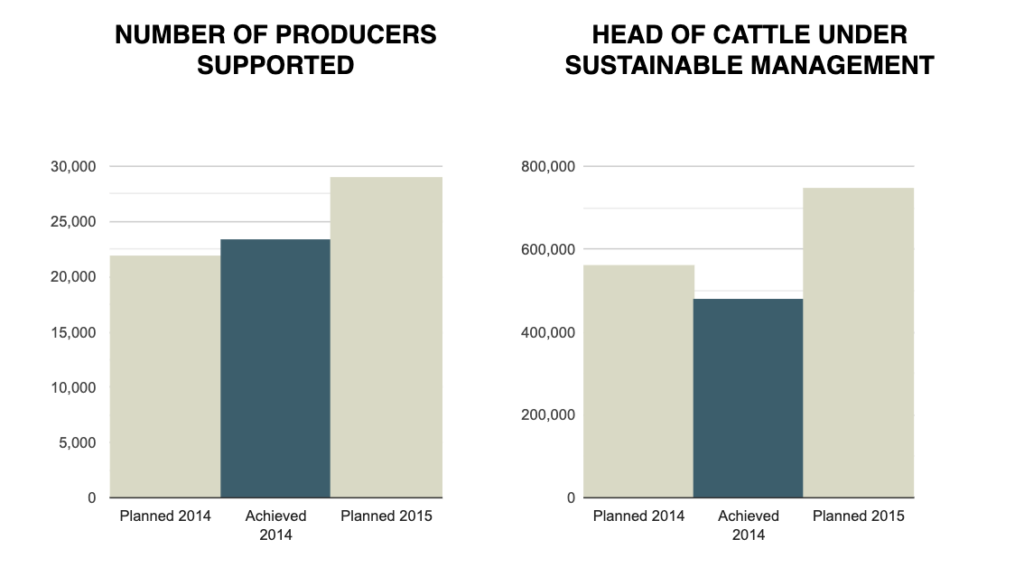
RESULTS
Field projects have been established and are gaining traction. Identifying, testing and implementing viable alternatives is just one of the benefits resulting from these initiatives. Right now, the numbers are somewhat lower than expected, but the proofs of concept developed by our partners are outstanding. These include:
- higher revenues
- reduced mortality rates in livestock
- increased productivity
- more sustainable stocking rates.
These results show that solutions can be found in different parts of the world that lead to growth and sustainable production going hand in hand.
Bringing different actors from the same value chain together continues to be a major driver of change. Solidaridad is proud to be participating in several multi-stakeholder initiatives. At the global level, this has led to the launch of the “Principles & Criteria for Defining Global Sustainable Beef” by the GRSB. At the local level, it has enabled the Brazilian Roundtable on Sustainable Livestock (GTPS) to inspire seven joint initiatives in five states.
REGIONAL COMMODITY PROGRAMMES
- CENTRAL AMERICA
- NORTH AMERICA
- SOUTH AMERICA
- SOUTH & SOUTH-EAST ASIA
- SOUTHERN AFRICA
- EAST & CENTRAL AFRICA
- THE NETHERLANDS
Twenty farmer field schools are helping 520 farmers implement silvopastoral systems, improve cattle management, and increase milk production. The larger intended outcome is to help the entire livestock sector in Nicaragua adapt to climate change, achieve better environmental outcomes, and increase incomes.

The Chaco is experiencing the most rapid deforestation of any ecosystem in South America. Solidaridad North America, in partnership with Solidaridad South America, is in the process of rallying local and supply chain stakeholders in support of an alternative development path for the region’s livestock sector.

The launch of the Global Roundtable on Sustainable Beef (GRSB) principles and criteria has brought Solidaridad once more to the fore as we continue our work to establish common ground in a crucial agricultural sector. The next challenge is to turn global principles into local practice.

For agriculture to endure, farmers need the capacity to sustain the land they live on as well as themselves. That’s why Solidaridad works with supply chain actors in Bangladesh to help them increase productivity. Investments by Solidaridad and private sector partners help farmers progress from day-to-day subsistence towards a sustainable business-oriented future.

Two major concerns with traditional livestock farming are overgrazing and poor commercialization. Key to the successful implementation of Solidaridad’s two livestock projects in Southern Africa has been securing the support of traditional leadership structures to address these issues.

Solidaridad initiated a project on improving beef productivity with other stakeholders. We also participated in the UN’s Food Agriculture Organization (FAO) multi-stakeholder initiative “Global Agenda for Livestock Dialogue”, which aims to promote the sustainability agenda and create sustainable land use practices in the livestock sector.

Smallholder farmers in Bangladesh have benefited from Solidaridad’s support through better farm management, milk quality, self organization and market access. Meanwhile new programme proposals have been developed with donors and companies in the extensive global livestock sector.

IMPACT
We have to be realistic. Initiatives to encourage sustainable cattle ranching will not have a major impact in just a few years. However, the principles of sustainable production are valuable. Research conducted by our partner IIS in the Brazilian Amazon has shown that the future of beef cattle ranching without deforestation depends on:
- the size of the ranch
- the availability of technical assistance
- intensification of pasture management
- access to credit.
Solidaridad’s partner, Instituto Centro de Vida (ICV), developed and tested this concept, which has led to a multi-stakeholder programme called Novo Campo. This involves producers, processors, local government and civil society – and potentially also retailers, who are likely to join in 2015.
However, research results are not the only way to prove that change is occurring. Taking a close look at patient, long-running work with local communities in countries around the world reveals many positive impacts. This is certainly the case in the East Cape of South Africa, where the Olive Foundation’s pilot project – which is centred on holistic pasture management in a single community – was put to the test by devastating weather patterns. Drought in the region, followed by uncontrolled bushfires took a heavy toll on the pastures and consequently on herds. Thankfully, the resilience of the pastures managed in the pilot project proved to be greater than expected and the recovery faster and healthier. News of such benefits travels fast and nearby villagers are currently keen to join the programme.
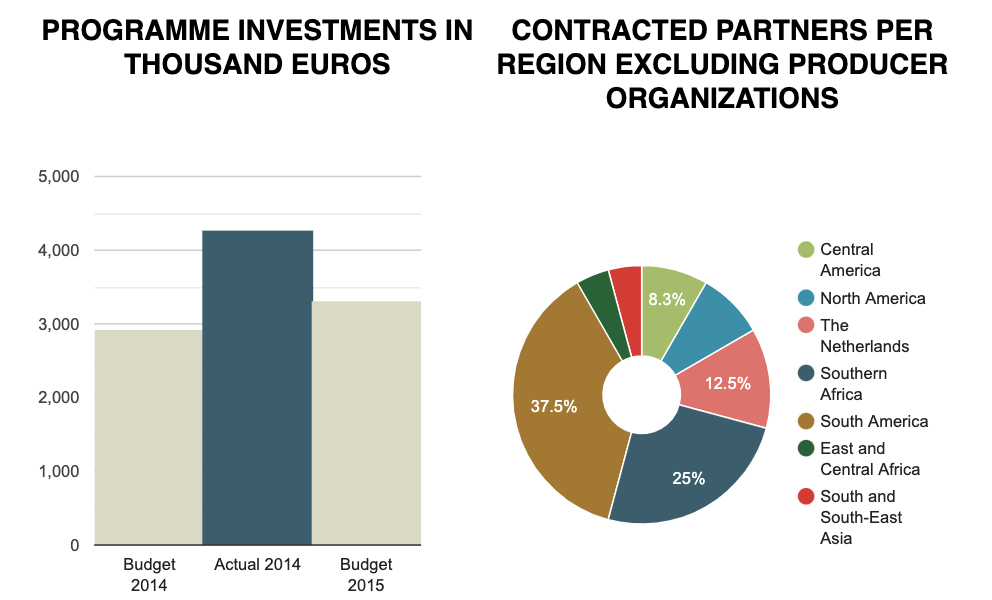
MARKET PARTNERSHIPS
Strict food and safety regulations for international trade in fresh products such as beef and dairy, as well as EU production and import restrictions, mean that the market development strategy in our livestock programme has to centre on local and regional markets. A concrete example of this is the SaFal food security project in Bangladesh, where over 17,000 (mostly) women farmers now receive technical assistance which helps them to reduce mortality rates in cattle and to increase the quality and volume of milk so that they can continue to make a major contribution as a source of crucial animal proteins for the local population.
In Namibia, joint projects with meatpacker Meatco and the Danish Coop, a retailer for the Savannah brand, help communal farmers combine the export of Namibian beef with support for communal sustainable cattle ranching. Progress is being made with market development partnerships with Zandbergen and Alianza de Pastizal, which focuses on beef exports from Uruguay. In Paraguay, market research around developing a Paraguay Natural Beef concept is under way. This initiative is led by our partner Asociación Rural del Paraguay (ARP).
SOLIDARIDAD’S LIVESTOCK NETWORK

CHALLENGES AHEAD
The past year was a period when projects became firmly established and started delivering results. The proof of concept of sustainable solutions for cattle ranching and dairy production is of great importance in helping this sector contribute to generating more income for producers, feeding the world’s growing population and protecting the environment. However, major challenges remain and a proven concept alone is clearly not sufficient.
Solidaridad and its partners will work hard to develop these concepts further, facilitate sharing and learning of best practices, as well as lobbying for the right policies so that these tested solutions find fertile ground and are broadly adopted. Support for promoting regional multi-stakeholder initiatives around beef and dairy value chains will be an important part of our work in the years ahead.
FISH FOR FOOD
Aquaculture is the fastest growing food production sector. Fish farmers have to meet rising expectations in order to help satisfy the rapidly growing demand for high-quality animal proteins, while sustainably compensating for the declining number of fisheries. The sector faces serious sustainability issues, but at the same time has the potential to produce high-quality proteins in ways that are more sustainable than most other forms of intensive animal husbandry.
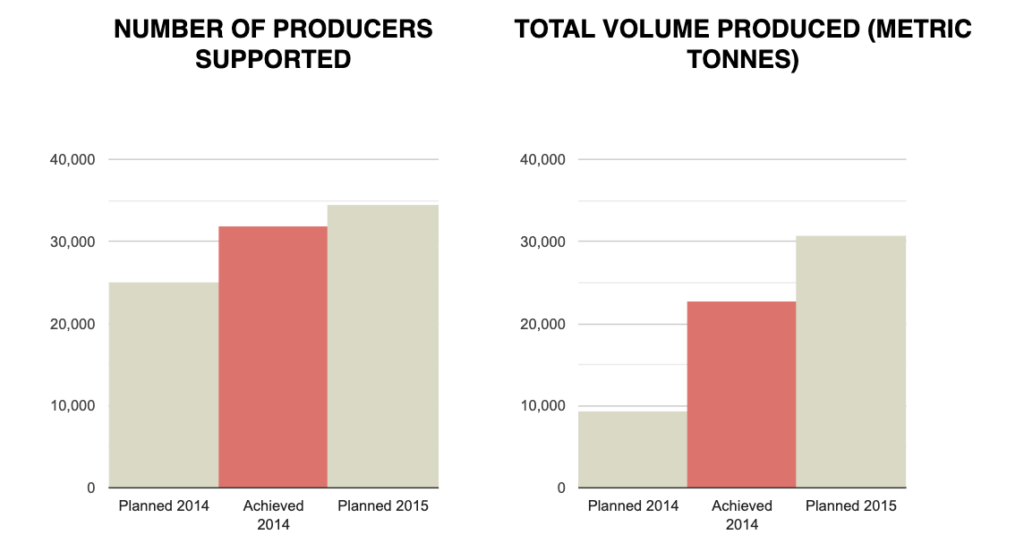
RESULTS
Using the resources of just one programme in Bangladesh, we expanded our programme to include eight new projects, – plus various pilots and promising leads – over the past two years. These include the Seafood Trade Intelligence Portal BV (STIP), a major aquaculture programme that is now coming on stream in Myanmar, a collaboration with the Dutch company Seafood Connection, an initial project in India, an organic shrimp project in Bangladesh, and a Solidaridad initiative to establish a national standard for shrimp production through a sector association of semi-intensive shrimp farmers in Bangladesh.
The Sustainable Agriculture, Food security and Linkages (SaFaL) programme – a partnership between Solidaridad and the Dutch embassy in Bangladesh – received a positive mid-term review. It exceeded all of its targets:
- Over 28,000 fish and shrimp farmers were supported
- Nearly 18,000 hectares of ponds were covered by the programme
- Nearly 10,000 tonnes of fish and shrimp were produced by farmers affected by the programme and eight containers of processed organic certified shrimp were exported to Europe.
One of the programme’s innovations includes an association of leading farmers, who will offer commercial services and high-quality inputs to less experienced colleagues, as well as training on their own farms.
The STIP Business Plan has been approved by the Solidaridad Netherlands supervisory board and the Dutch limited company STIP BV, which was founded early in April 2015, with five of Solidaridad’s regional expertise centres as shareholders. The website and portal were launched during the Brussels Seafood Expo in 2015.
REGIONAL COMMODITY PROGRAMMES
Solidaridad Netherlands and our partners Seafood Connection have connected 3500 smallholder organic shrimp farmers to European markets, shipping eight containers of black tiger shrimp from Bangladesh and ushering in a new era of sustainability in aquaculture.

IMPACT
The aquaculture programme in Bangladesh will be evaluated in 2016, looking at the uptake of sustainable farming practices leading to productivity and income increases and consumption of nutritious food among the target groups.
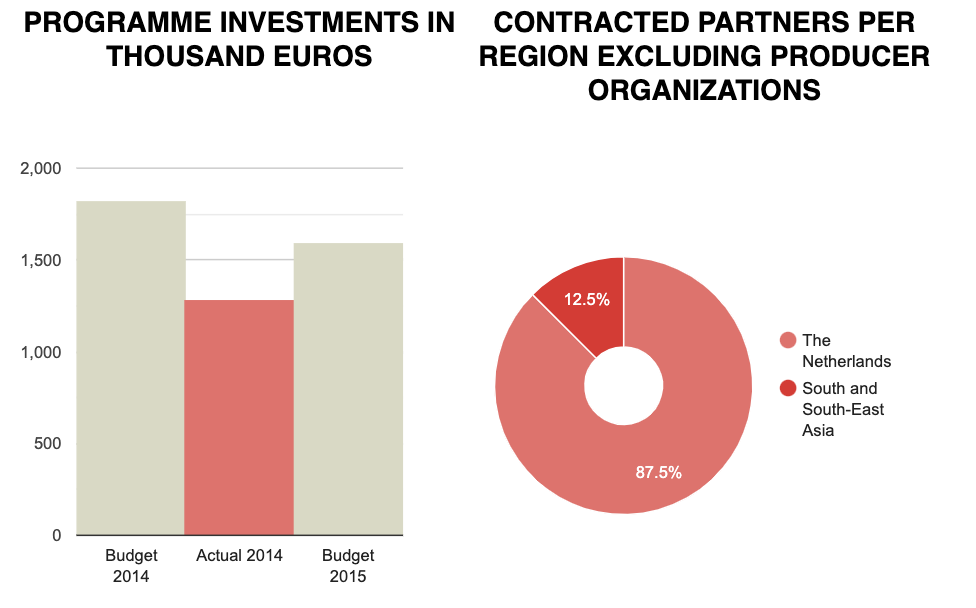
MARKET PARTNERSHIPS
Participation in STIP provides seafood companies with an opportunity to transform fragmented aquaculture supply chains. STIP’s mission is to increase transparency and, to this end, it collects data from processing factories around the world, viewing exporting processors and their sector organizations as entry points to aquaculture’s complex global supply chains. The STIP also has the potential to engage with the small and medium-sized enterprises which dominate the sector and to identify sourcing and investment opportunities.
Our partnership with Seafood Connection, a subsidiary of Maruha Nichiro, the world’s largest seafood company, was formalized and an ambitious programme for Bangladesh was agreed. Solidaridad and Seafood Connection aspire to work together with retailers to increase volumes of sustainably sourced shrimp from Bangladesh sold in European and North American markets.
In Bangladesh, Solidaridad’s aquaculture team has established a number of inspiring private-sector partnerships with local companies, including processing factories and suppliers of inputs.
SOLIDARIDAD’S AQUACULTURE NETWORK

CHALLENGES AHEAD
Rather than expecting to be able to improve the sustainability of supply chains across the board, the aquaculture programme will prioritize developments that maximize benefits for society. It will prioritize sustainable aquaculture for food and nutrition security and aim to enhance the quality and productivity of shrimp farming by integrating it with mangrove restoration.
Through affiliations with national sector organizations, the STIP will offer a platform for producers to convene around a shared agenda for sustainable supply chain development, and Solidaridad will provide matching funds for development projects.
Encouraging joint investments from consortia of seafood companies in an inclusive way helps the aquaculture programme ensure that access to inputs and markets also benefits smaller-scale producers. Our proposal for inclusive aquaculture development in Myanmar has helped to inspire the EU commission to allocate €20 million to a major aquaculture programme, with Solidaridad as one of four possible partners.
Solidaridad, Wageningen UR and World Fish Centre have started scoping out countries in Africa, focusing on Kenya, Ethiopia and Ghana as potential target areas for aquaculture development.
ORGANIZATION
ORGANIZATIONAL STRUCTURE
Solidaridad is an international network organization with partners all over the world. There is a single agenda and a single strategy: together we learn and progress, together we achieve results and together we decide on future steps.
Solidaridad’s organizational structure reflects the principle of interconnection: a participative approach with autonomous local structures on the one hand and mechanisms for management and collaboration on the other. Solidaridad Network Foundation operates as a capable, efficient network secretariat at the heart of ten regional centres, ensuring and promoting interconnection. By choosing the structure of a secretariat instead of a head office, Solidaridad avoids a cost centre that absorbs too many resources and thus detracts from what really counts: our presence in the regions, close to our partners in the field.
The network secretariat is located at the same location as the Solidaridad Netherlands office in Utrecht. As a service centre for the ten regional organizations that comprise Solidaridad, it provides services related to our quality assurance systems and standards for financial management, accountability and control, planning, monitoring and evaluation, ICT infrastructure and human resource management. The secretariat is responsible for global communication, including our international website and for the development of tools for global branding as well as communication guidelines. Another important role is to facilitate global policy development by supporting our global organizational entities such as the Executive Director, the Executive Board of Directors, the Global Commodity Teams and the Global Account Teams.
ORGANIZATION CHART

Click to enlarge image
SUPERVISORY BOARDS
Within Solidaridad, the International Supervisory Board (ISB) provides the highest level of international oversight. The ISB monitors policies, the quality of programmes, financial control and the performance of the Executive Board of Directors (EBoD).
To avoid each regional expertise centre (REC) needing to appoint its own local supervisory board, the direct supervision of the RECs is organized on a continental basis. Each Continental Supervisory Board (CSB) is represented in the ISB by its chairperson, thus enabling the ISB to focus on the interests of Solidaridad Network as a whole, instead of focusing on individual RECs. Until 2014, setting up the ISB was still a work in progress and the CSB of Solidaridad the Netherlands represented the ISB. In June 2014, the ISB of Solidaridad Network met for the first time and in December 2014, the second meeting was held. The members of the ISB are:

Because of the sudden tragic death of the widely respected ISB representative from Africa, Prof. Kwadwo Asenso-Okyere, in May 2014, a new representative of the African continent had to be found. His role and position in the African CSB were taken over by Mrs. Mariam Dao Gabala from Ivory Coast, who joined the CSB in November and participated in the second ISB meeting on 18 December 2014. The Continental Supervisory Boards are now becoming mature. The target composition is five members to ensure a balanced composition in terms of gender, regional representation and areas of expertise and knowledge.
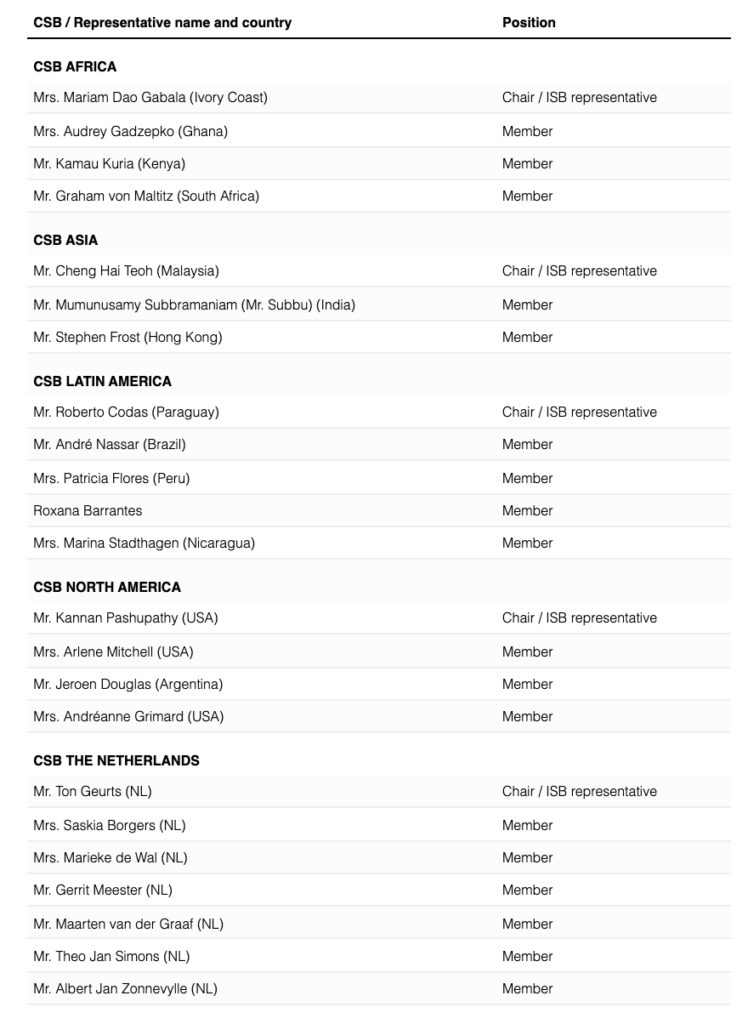
NETWORK MANAGEMENT
The Solidaridad Network strives to be an effective, influential, innovative learning organization with a reputation as one of the best NGOs engaged in international development cooperation. This requires a wide range of checks and balances. In 2014 a revised management structure was put in place.
MANAGEMENT
Instead of choosing a top-down CEO model, the network has an Executive Director (ED) who works closely with the managing directors (MDs) of the RECs. The relationship between the ED and the MDs is like a two-sided coin. The MDs have a strong mandate to manage the operation in the regions using the full scope of their capabilities. Empowered local leadership creates a strong sense of ownership and responsibility. The knowledge which we bring together in our local teams is a precondition for success and enhances the ability of a local community to determine its own future. But strong mandates demand accountability. This is provided in the governance line to the CSBs and in the management line to the ED, who in turn is held accountable by the ISB.
The mandate of a director is defined by an approved framework. The CSBs “supervise” regional managers, while the ED can be seen as his or her “general manager.” In line with the principle of interconnection between regional centers and the network secretariat, good arguments and balanced insights enable common decision making in most cases. Corrective steps only need to be taken in exceptional cases.
The other side of this coin is that regional directors are also co-leaders in the global Solidaridad network. The MD is a full member of the EBoD – the global leadership team – and this membership creates the possibility for participation in global policy setting, thus enhancing ownership and discipline. Jointly, the ED and MDs are responsible for coherence within the network. All directors must adhere to agreed policies and encourage optimal cooperation, open communication and knowledge exchange between the RECs. Furthermore, they are responsible for fostering a “giving culture” among RECs (mutual giving implies give and take), making fair deals on payment for joint and mutual services and joining forces in order to be stronger together.
As per 1 September 2014, Nico Roozen was appointed by the ISB as the full-time ED of Solidaridad Network. Until 30 August 2014, he combined this function with the statutory directorship of Solidaridad the Netherlands. Solidaridad Network Foundation, which was founded in 2011, is based in Utrecht, the Netherlands. In December 2013, Solidaridad formalised new statutes, in accordance with circumstances in the network.
QUALITY
Solidaridad aims to achieve high quality on all fronts. External auditors provide independent evaluations of the quality of each aspect of its operations. All regional expertise centres have, or are in the process of achieving, certification under the ISO 9001:2008 norm. Solidaridad the Netherlands, the largest regional centre in our network, is entitled to use the quality mark of the Central Bureau on Fundraising (CBF) and complies with its requirements. The CBF monitors all philanthropic bodies in the Netherlands and evaluates their management and policy in order to increase the transparency of the charity sector.
The Dutch Association of Fundraising Organizations (VFI) is the umbrella organization for philanthropic organizations that raise funds in the Netherlands. Its goal is to increase public confidence in fundraising institutions. Solidaridad Network Foundation and Solidaridad Netherlands uphold the principles of the VFI in relation to respect, reliability, openness and quality and promote standards across the network. Through the Solidaridad Network Foundation, other RECs also respect the principles of the VFI.
RISKS
TRUST FIRST …
While Solidaridad’s employees and partners work on the basis of reciprocal trust, management guards against individual abuses of this trust. Risks – and their consequences for strategy – are continually assessed. The Executive Board of Directors is aware that economic conditions can change quickly, politics can be unstable, and markets volatile.
RISK MANAGEMENT AND CONTROL SYSTEMS
Solidaridad is committed to transparency and the effective deployment of resources. It monitors project progress and the use of funds with a cloud-based project management system. Operations are audited and outcomes are discussed with REC management and CSBs. Solidaridad has recently renewed its code of conduct, which all RECs have endorsed. This code focuses on honest, respectful behavior towards everyone involved. There is also a protocol for inappropriate behavior, which includes procedures designed to prevent undesirable behavior and procedures for involving internal or external counselors as well as a complaints procedure for employees.
The internal risk management and control systems of each REC provide reasonable assurance that financial statements are correct and that these systems have worked properly during the year under review. Each REC has its financial statements audited before 15 April and all financial statements have received unqualified audit statements.
MAIN RISKS
- Reputational damage resulting from partnerships with companies. Solidaridad has internal guidelines for NDAs and MoUs with companies.
- Illegitimate use of grant funds, which requires repayment obligations to donors. The budget is approved by the MD of each REC and the segregation of duties in the project management is appropriate.
- The economic climate and the willingness of private donors to donate. Solidaridad maintains quality marks and periodic external audits ensure compliance.
- The unpredictability of government policies. Political decision-making – and available funding – are hard to predict, as are the political forces which affect partner companies. Solidaridad defines thematic areas and targets policy makers with the greatest chance of success for the period ahead.
CONTROL
Solidaridad produces a long-term Strategic Plan, which shows how it translates its mission and vision into operational objectives. This plan is drawn up by the management of all RECs and approved by the International Supervisory Board. The annual plans of each REC are a translation of the multi-annual strategic plan into more specific objectives, desired results, activities and budgets. A context analysis and evaluation of the previous annual plan serve as a guideline for preparing the next annual plan. External reporting includes an annual report and accounts, which are verified by an auditor and accompanied by an auditor’s opinion. The auditors discuss their findings with the MD and financial controller of each REC and may also call the attention of the CSB to any points that need to be addressed, or where improvements could be made.
REMUNERATION
Solidaridad Network Foundation and Solidaridad Netherlands adhere to the Dutch Wijffels Code and the VFI’s Guidelines for the Remuneration of Directors in Philanthropic Organizations (Adviesregeling Beloning Directeuren van Goede Doelen). The latter proposes a framework for annual incomes for management positions in philanthropic organizations. All managing directors throughout Solidaridad as well as the Executive Director are remunerated according to the Basic Score for Management Positions (BSD) that the framework provides. The total salary costs, including social charges and pension costs, for the Executive Director of Solidaridad in 2014 were €140,973 (2013 €135,818).
REMUNERATION OF THE SUPERVISORY BOARDS
In accordance with Solidaridad’s statutes, neither the members of the International Supervisory Board nor the Continental Supervisory Boards of Solidaridad receive remuneration of any kind.
FINANCIAL REPORT
The budget of the Solidaridad Network increased from €33,800,000 in 2013 to €42,387,000 in 2014. This figure is slightly above target.
AGGREGATED BUDGET
The total amount that Solidaridad Network received in 2014 was €42.4 million, just above the budget for the year, which was set at €42 million. The contribution of the RECs in the global south increased to 51% of the total budget (2013: 44%).
Consolidated Income Statement Solidaridad Network 2014
in € 1,000

Solidaridad only includes contracted income in its budgets and reports on income that has been used as actual. The risk that spending falls short of budget is limited to the extent that contracted income is not fully used in the current year.
Solidaridad expects income to grow to €70 million in 2017, reaching a budget of €100 million in the years after 2017.
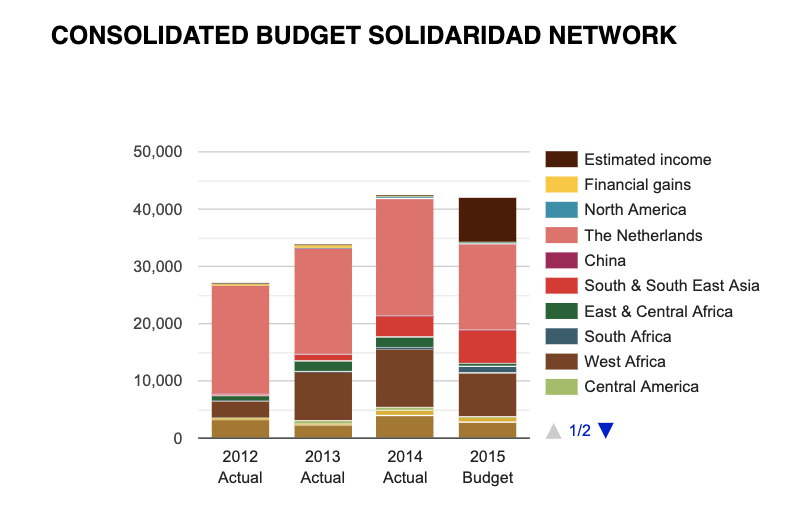
INCOME, EXPENDITURE AND RESULTS PER REGION
List of abbreviations:
- Solidaridad South America – SAM
- Solidaridad Andes – Andes
- Solidaridad Central America – CAM
- Solidaridad West Africa – WAF
- Solidaridad South Africa – SAF
- Solidaridad East & Central Africa – SECAEC
- Solidaridad South & South-East Asia – SSEA
- Solidaridad China – China
- Solidaridad The Netherlands – NL.
- Solidaridad North America – NA
- Solidaridad Network Secretariat – NS
Income & Expenditure Statement (Solidaridad GAAP)
All RECs (before consolidation) in € 1,000
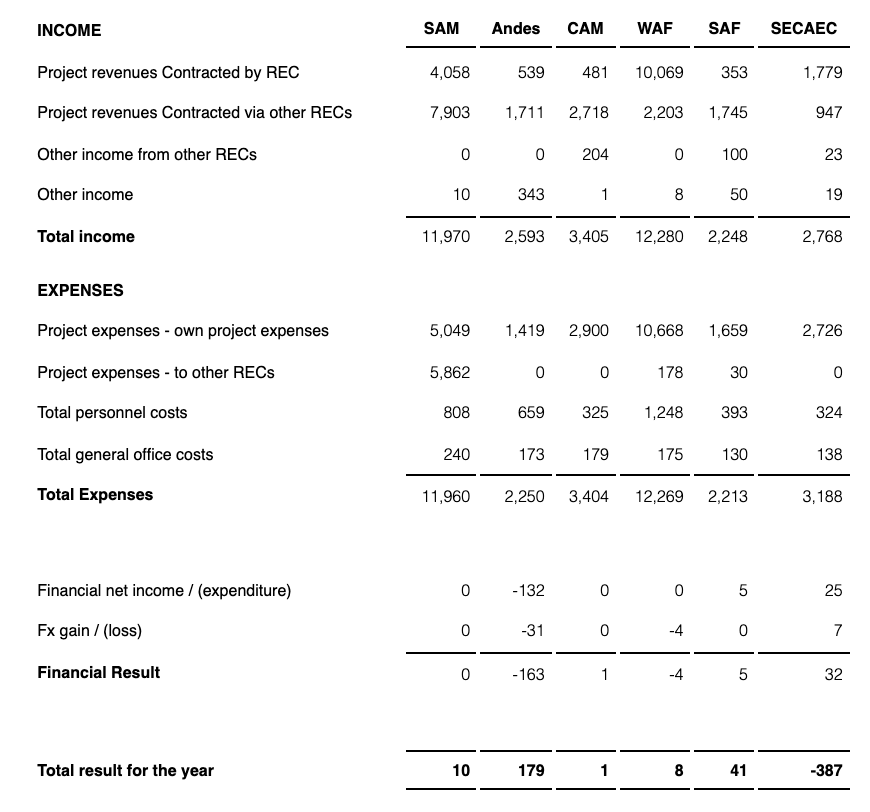
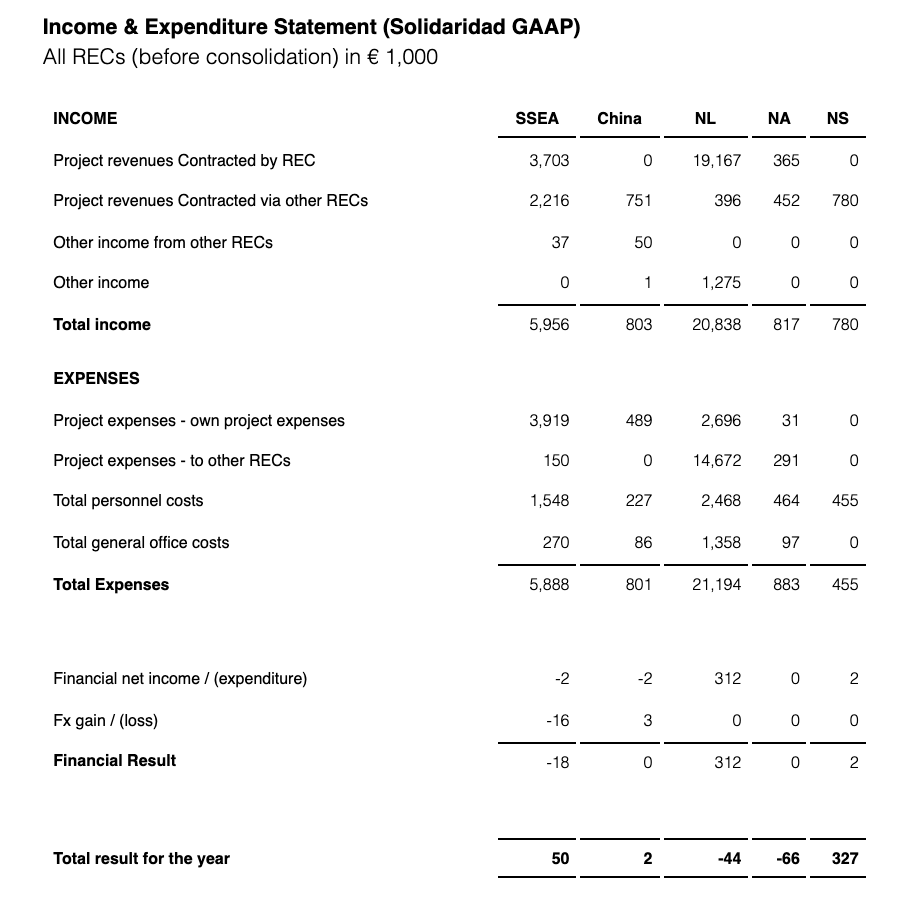
The figures presented above cannot be accumulated to represent aggregated income and expenditure because they contain inter-regional flows of funds. At Solidaridad we are in the process of harmonising our accounting methods and expect to present consolidated financial statements for the accounting year 2015.
Income per REC is split between the amount that a REC has formally received itself and what has been received via other centres. The total expenditure of a REC generally provides a good idea of its size and its activities. Project expenditure has either been invested via other organizations in the Network or has been invested by the REC itself.
Salary costs in one expertise centre are difficult to compare to those in another. Salary costs vary between RECs because they depend on price levels – and inflation – in the regions. Relative comparisons also reveal differences. RECs that use external consultants for some of their projects have relatively lower salary costs. Smaller expertise centres spend a relatively large proportion of their total expenditure on salaries. And finally, some RECs are more heavily engaged in activities such as fundraising, communication and market linkage.
The Annual and Financial Reports of Solidaridad Europe are published here.
STAFF PER REGION
The total number of employees employed on 31 December 2014 was 365 (2013: 277 employees). Note that this number corresponded to 335.2 FTE as per year end 2014 (2013: 267.1 employees).
